4 Volumes
Constitutional Era
American history between the Revolution and the approach of the Civil War, was dominated by the Constitutional Convention in Philadelphia in 1787. Background rumbling was from the French Revolution. The War of 1812 was merely an embarrassment.
Money
New volume 2012-07-04 13:46:41 description
Nineteenth Century Philadelphia 1801-1928 (III)
At the beginning of our country Philadelphia was the central city in America.
Worldwide Common Currency and Corporate Headquarters
The Death of Money
American Finance After Robert Morris
Robert Morris can be fairly said to have made the American Revolution possible.
Unwritten Features of the Constitution
 Considerable anger is sometimes directed toward Judges who find unintended provisions in the Constitution. On the other hand, James Madison and some other Founding Fathers were careful to design the Constitution to create outcomes that are far from explicit. 
|
In their early writings, James Madison and the Federalists who participated in drafting the Constitution repeatedly emphasized their allegiance to republican ideals, republicanism, and a republican form of government. This sounds a little odd today, since obviously they were not alluding to the present Republican and Democratic parties, which had not been created. It seems natural to us to regard a republican form of government as a gradual extension of a democratic one, when the size of the electorate grows so large it cannot be readily managed by voice votes in a town meeting, when therefore it becomes necessary to select proxies, or representatives. That description greatly underestimates the subtlety of the Founding Fathers.
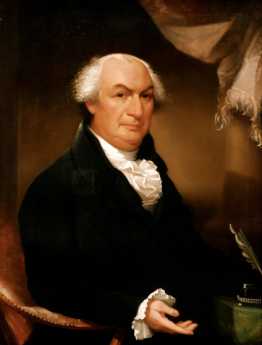
|
| Gouverneur Morris |
Two centrally important members of the Convention, James Madison and Gouverneur Morris, felt especially strongly about a feature that does not occur to many others. When the voters in a particular district pick a representative, they are generally trying to choose one who will not only reflect issues of local importance, but one who will be able to persuade representatives of other districts to vote favorably. In this way, representatives tend to be selected who are taller, handsomer, more intelligent, richer, and more famous than the average person in the district being represented. Not by much, perhaps, and sometimes not at all. But as a general thing, the election of representatives tends to create a House of Representatives who are superior in certain ways to the average person being represented. When candidates and political parties engage in public combat, an impression is given that "politicians" are low characters, but that is in fact not usually true. Many factors will discourage the best candidates from participating in disagreeable contests, and many stratagems are employed in an attempt to elect the worse of two candidates. But it is seldom the case that a successful candidate is less attractive or talented than the average person in his district. Republican governments almost always are composed of more distinguished persons than average, exposed to greater temptations perhaps and subject to more detailed scrutiny.
Madison was so taken with this idea that he proposed the Senate should be made up of people drawn from the House of Representatives in a second round of voting, thereby further purifying the result. For various reasons this approach was not adopted by the Convention, but it does have a logic to it, and it clearly illustrates that Madison was looking for results not always explicitly stated. Gouverneur Morris, on the other hand, was openly enthusiastic for this outcome, because he perceived that the government would be largely concerned with the rules of commerce and therefore the selection process would likely lead to a Congress that was richer and more able in those qualities of importance to commerce. On the one hand, America would gain national advantage in the Industrial Revolution then under way, and it would anyway be highly desirable to select richer people. In his later years, Morris was given to blunt and open preference for the smart set, and is often described as a covert aristocrat. At the time of the Convention however it seems likely he was making a perfectly valid point which had escaped many of his colleagues.
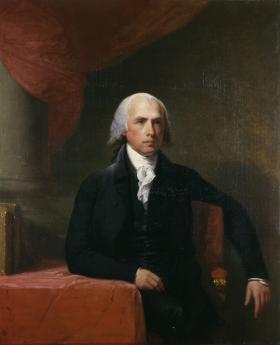
|
| James Madison |
Both Madison and Morris were seriously concerned about a flaw in the republican form of government. They thought it obvious there would always be more poor people than rich ones. Without some effort to rebalance things, the poor would inevitably destroy the common good by using their numerical strength to redistribute wealth from rich to poor. In doing so, everyone would be worse off, even the poor. The poor were more likely to be uneducated and thus more likely to put their own enrichment ahead of almost any other issue, using their own grievances as a justification. There was almost universal agreement among other members of the Convention, because it was well recognized that the main need for a new constitution had grown out of the egregious conduct of state legislatures under the Articles of Confederation, particularly in watering the currency with paper money, and profligate use of debt forgiveness. It would be impossible to have a prosperous country if it suffered from instability, destruction of merit incentives and respect for the property of others. If debts were capriciously forgiven, no one would lend. With paper currency printed indiscriminately, savings would be impossible.
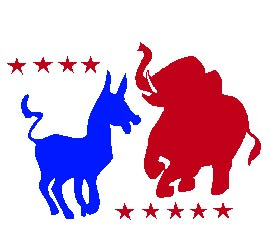
|
| Political parties |
Accordingly, the Convention set about balancing these innate tendencies as well as it could. There was general agreement that election districts with larger population size tended to produce better candidates. Not only employing the reasoning that in a larger district it would be harder to elect an unknown, insignificant person, they felt they could also see examples justifying faith that a larger number of competing internal interests would hold each other in check within the person of their elected representative. An indirect way of accomplishing this was to limit the total number of districts while also providing they be of equal population. Political parties were soon to come forward as a way of raising campaign funds, but nevertheless a person of greater means would have an advantage in a larger district, and persons of greater means could be expected to have greater talents, or would in any event be more likely to resist the pressures for redistributing the wealth of the rich. Members of the Senate were selected by the state governments (at least, as long as state assent was necessary for ratification of the Constitution), but the 17th Amendment changed that to popular election, with a clear resulting decrease of state influence and power. On the other hand, a heavy majority of Senators in the 21st Century continue to be independently wealthy, thereby still accomplishing two original objectives of the founding fathers at one stroke.
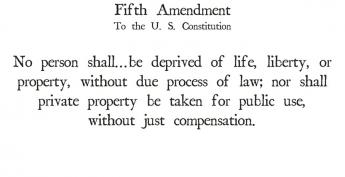
|
| 5th Amendment |
The original working concept of the Federalists was that the skills and prestige of the rich and powerful would promote the owners of property into elective office, and their power would be joined to that of judges, presidents, cabinet officers, and military officers to form an effective counterbalance to the majority voting power of the poor or others who lacked property to protect. The Federalists differed with the anti-Federalists on the source of danger to be guarded against; one group feared impetuous and ignorant greed inciting the multitude, while the other group mainly feared corruption and power-hunger among the powerful few. But both political parties acknowledged that each potential danger was realistic to some degree, and hence there was reason to hope both sides could agree to a balance of power as a sensible check on each other. True, the Fifth Amendment's "takings" clause did specifically provide for just compensation for private property seized by government under Eminent Domain, and the Eleventh Amendment protected state governments against private lawsuits in Federal court, but these seem rather feeble additions to the protections against potential tyrannies of the unpropertied majority, as soon to be seen in the revolutionaries of France. Thus an initial assessment would have to be that protection of the minority with property against legislative assault by the unpropertied majority, was only strong in the short run. But it was likely to succumb in the long run to majoritarian tyranny, as the less educated gradually learned how to use their voting power. To strengthen the balance, therefore, resort was made to limiting the voting franchise to owners of property, and specifically to freehold property, without debt. There was shrewdness to this idea, since it hints at a perception that future class divisions might not lie between rich and poor, but between creditors and debtors. The voting exclusion of females, children and slaves was surely irrelevant to the main issue, based on the 18th Century assumption that any votes from those excluded would anyway be passive, dominated by the male head of household. In any event, the limitation of voting power to freehold property owners was apparently a step too far, and did not last long.
It is not certain how consciously another important feature was considered. State legislatures prior to the Constitution were held in such disdain, that stripping them of the power to corrupt truly important issues was almost a universal goal. Awkwardly, a peaceful transfer of state power over the military and the currency could not be accomplished without securing the agreement of the states who had to ratify the Constitution. This was accomplished by specifying the strictly limited powers of the new Federal government, and ceding control of everything not specifically mentioned, back to the states. One by one, the functions which were vitally important were debated and defended in detail; the list was short. Everything else remained under state control. To go about things in this way had one significant advantage over complete federal control, and Madison specifically anticipated it. If a state government abused its power, the victims of that abuse could escape by relocating to a neighboring state. The potential abuse easiest to understand was a burdensome tax rate. But all of the commercial rules of the new entities called corporations were even more to the point, since rich people could move whole factories and businesses if they perceived enough grievance at home. Powerful people had ways of getting the attention of state governments, their U.S. Congressmen and Senators, and the constituents who voted for them. In New Jersey at present, 4% of the taxpayers pay 76% of state taxes; it is easy to demonstrate that the 4% are moving to other states about as fast as they can. Whether by industry or individually, the residents of a state know very well what their alternatives are in other states, and corporations can negotiate them directly. Whether to bluffing or actually moving, state politicians respond to the threat and which has considerable indirect effect at a national level. The system of checks and balances extends far beyond the words of the Constitution, and well beyond the rules of the Federal government. Its unwritten power extends beyond the control of a handful of Supreme Court justices, spatting over original intent. Its potential weakness, of course, lies in the Court's relative inability to protect what is not stated to be any of its business.
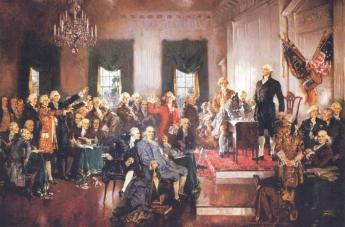
|
| 1787 founders |
One final point about the unspoken cleverness of our Constitution. Some of its most important powers were either unrecognized or intentionally unmentioned by its originators, to whom we look for original intent. After two centuries, we can see as they could not, that it was not merely the first time thirteen sovereign states gave up their power voluntarily and more or less cooperatively. In two hundred or more years, it begins to look as though nobody else can even imitate it successfully. One therefore hesitates to suggest changes of any sort, for fear some unrecognized balance will become unbalanced. Madison believed that increasing size leads to better government and better candidates for office; few would dispute that our Federal government generally does a better and more professional job than the fifty states which make it up. But stop to consider the United Nations. Invested with as much enthusiasm and much more idealism than our 1787 founders, the U.N. flounders and fumbles, and after fifty years must still be assessed to be a failure. Madison would seemingly have predicted that a bigger organization would be even stronger, even electing an assembly of giants. It hasn't worked out that way, and it is impossible to define what it lacks that the American Constitution has in abundance. By itself, this is the strongest possible argument for what is called original intent, but is really just a fearful plea to -- leave it alone.
After the Convention:Hamilton and Madison
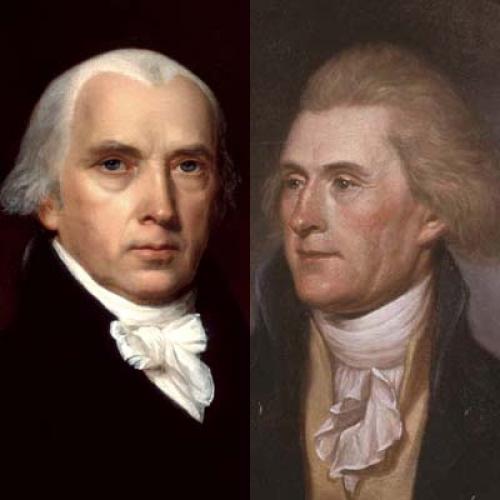
|
| Signers |
The Federalist Papers were written by three founding fathers after the Constitution had been completed and adopted by the Convention. Detecting hesitation in New York, the aim was for publication in New York newspapers to persuade that wavering State to ratify the proposal. It is natural that The Federalist was composed of arguments most persuasive to New York, putting less stress on matters of concern to other national regions. This narrow focus may explain the close cooperation of Hamilton and Madison, who must surely have suppressed some latent concerns in order to present a unified position. In view of how much emphasis the courts have placed on the original intent of almost every word in the Constitution, it seems a pity that no one has attempted to reconcile the words of the principal explanatory documents with the hostile disagreements of their two main authors, almost as soon as the Constitution came into action. Perhaps the psychological hangups would be more convincingly dissected by playwrights and poets, than historians.
John Jay wrote five of the essays, mostly concerned with foreign relations; his presence here highlights the historical likelihood that Jay might have been the one who first voiced the idea of replacing the Articles of Confederation. At least, he seems to have been first to carry the idea of a general convention for that purpose to George Washington (in a March 1786 letter). The remaining essays of The Federalist were written under the pen name of Publius by Alexander Hamilton and James Madison, both of whom had a strong enough hand in crafting the Constitution, but who quickly became absolutely dominant figures in the two central political factions after the Constitution was actually in operation. And their eagerness to be central is itself telling. They were passing from a stage of pleasing George Washington with his favorite project, into furthering a platform for launching their own emerging agendas. It is true that Madison's Federalist essays were mainly concerned with relations between the several states, while Hamilton concentrated on the powers of the various branches of government. As matters evolved, Hamilton soon displayed a sharper focus on building a powerful nation; Madison scarcely looked beyond the strategies of internal political power except to see clearly that Hamilton was going to get in the way. These two areas are not necessarily incompatible. But it is nevertheless striking that two such relentlessly driven men could work together to achieve the same set of rules for the game they were about to play so unflinchingly. Thomas Jefferson had been in France during the Constitutional Convention. It was he who was most dissatisfied with the resulting concentration of power in the Executive Branch, but Madison eagerly became the most active agent for forming the anti-Federalist party, with all its hints that Washington was too senile to know the difference between a President and a King. Washington abruptly cut him off and never spoke to Madison after the drift of his opinions became undeniable. Today, it is common to slur politicians for pandering to lobbyists and special interests, but that presents only weak competition with the personal forces shaping leadership opinion, chief among them being loyalty to, and perceived disloyalty from, close political associates.
As a curious thing, both Hamilton and Madison were short and elfin, and both relied for influence heavily on their ability to influence the mind of
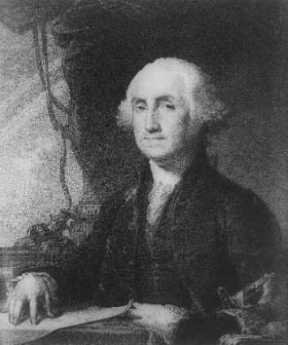
|
| George Washington |
George Washington, who projected the power and manner of a large formidable athlete. Washington had no strong inclination to run things and, once elected, no particular agenda except to preside in a way that would meet general approval. He had mainly wanted a new form of government so the country could defend itself, and pay its soldiers. Madison was a scholar of political history and a master manipulator of legislative bodies, while Hamilton's role was to supply practically unlimited administrative energy. Washington was good at positioning himself as the decider of everything important; somehow, everybody needed his approval. On the other hand, both Madison and Hamilton were immensely ambitious and needed Washington's approval. This system of puppy dogs bringing the Master a bone worked for a long while, and then it stopped working. Washington was very displeased.
The difference between these two short men immediately appeared in the way they chose a role to play. Madison the Virginian chose to dominate the legislative process as the leader of the largest state delegation within the

|
| Alexander Hamilton |
House of Representatives, in those days the dominant legislative chamber. Hamilton sought to be Secretary of the Treasury, in those days the largest and most powerful department of the executive branch. It's now a familiar pattern: one wanted to form policy through dominating the board of directors, while the manager wanted to run things his way, even if that led in a different direction. Both of them knew they were setting the pattern for the future, and each of them pushed his ideas as far as they would go. Essentially, this could go on until Washington roused himself.
After a short time in office, Hamilton wrote four historic papers about two general goals: a modern financial system, and a modern economy. For the first goal, he wanted a dominant national currency with mint to produce it and a bank to control it. Second, he also wanted the country to switch from an agricultural base to a manufacturing one. You could even say he really wanted only one thing, a national switch to manufacturing, with the necessary financial apparatus to support it. Essentially, Hamilton was the first influential American to recognize the power of the Industrial Revolution which began in England at much the same time as the American Revolution. Hamilton was swept up in dreams of its potential for America, and while puzzled -- as we continue to be today -- about some of its sources, became convinced that the secrets lay in the economic theories of
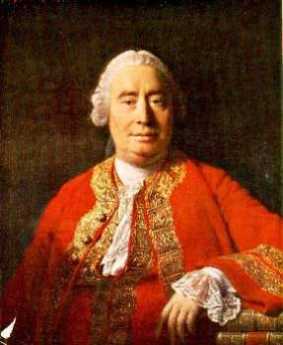
|
| David Hume |
David Hume and Adam Smith in Scotland, and of Necker in France. Impetuous Hamilton saw that Time was the essence of opportunity; we quickly needed to gather the war debts of the various states into the national treasury, we quickly needed a bank to hold them, and a mint to make more money quickly as liquidity was needed. It seemed childishly obvious to an impatient Hamilton that manufacturing had a larger profit margin than agricultural products did; it was obvious, absolutely obvious, that this approach would inspire huge wealth for the new nation.

|
| Industrial Revolution |
Well, to someone like Madison who was incredulous that any gentleman would think manufacturing was a respectable way of life, what was truly obvious was that Hamilton must be grabbing control of the nation's money to put it all under his own control. He must want to be king; we had just got rid of kings. Furthermore, Hamilton was all over the place with schemes and deals; you can't trust such a person. In fact, it takes a schemer to know another schemer at sight, even when the nature of the scheme was unclear. Madison and Jefferson couldn't understand how anyone could look at the vast expanses of the open continent stretching to the Pacific without recognizing in this must lie the nation's true destiny. Why would you fiddle with pots and pans when with the same effort and daring you could rule a plantation and watch it bloom? If anyone had used modern business jargon like "Win, win strategy", the Virginian might well have snorted back, "When you say that to me, friend, smile."
Alexander Hamilton, Celebrity
 He had the kind of taudry private life and flashy public behavior that Philadelphia will only tolerate in aristocrats, sometimes. 
|
It comes as a surprise that most of the serious, important things Alexander Hamilton did for his country were done in Philadelphia, while he lived at 79 South 3rd Street. That surprises because much of his more colorful behavior took place elsewhere. He was born on a fly-speck Caribbean island, the "bastard brat of a Scots peddler" in John Adams' exaggerated view, was orphaned and had to support himself after age 13. The orphan then fought his way to Kings College (now Columbia University) in New York in spite of hoping to go to Princeton, and has been celebrated ever since by Columbia University as a son of New York. He did found the Bank of New York, and he did marry the daughter of a New York patroon, and he was the head of the New York political delegation. As you can see in the statuary collection at the Constitution Center, he was a funny-looking little elf with a long pointed nose, frequently calling attention to himself with hyperkinetic behavior. Even as the legitimate father of eight children, Hamilton had some overly close associations with other men's wives, probably including his wife's sister. Nevertheless, he earned the affection of the stiff and solemn General Washington, probably through a gift of gab and skill getting things done, while outwardly acting as court jester in a difficult and dangerous guerilla war. There is a famous story of his shaking loose from the headquarters staff and fighting in the line at Yorktown, where he insolently stood on the parapet before the British enemy troops, performing the manual of arms. Instead of using him for target practice, the British troops applauded his audacity. Harboring no such illusions, Aaron Burr later killed him in a duel as everyone knows; it was not his first such challenge.

|
| Alexander Hamilton |
Columbia University President Nicholas Murray Butler told other stories of celeb behavior to reinforce Hamilton's New York flavor. But in the clutch, General Washington learned he could always trust Hamilton, who wrote many of his letters for him and acted as his reliable spymaster. When the first President faced signing or not signing the fateful bill to create the National Bank, a perplexed Washington had to choose between: the violent opposition of Thomas Jefferson and James Madison, or the bewildering complexity of Alexander Hamilton's reasoning in arcane economics. On the one hand, there was the simple principle that owing money was seemingly always evil; on the other was the undeniable truth that for every debit created, you create a balancing credit somewhere. Washington ultimately chose to go with Hamilton, whose reasonings he likely didn't understand very well. If you doubt the difficulty, try reading Hamilton's Report on the Bank, written to persuade the nation and its first President of the soundness of his ideas. And then consider the violence of even present-day arguments about such "supply side" economics.
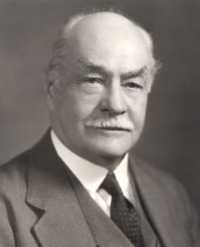
|
| Nicholas Murray Butler |
All of these momentous events happened in Philadelphia at places now easily visited in a morning's stroll. But Hamilton's image as a Philadelphian, doing great things in and for Philadelphia, was forever tarnished at one single dinner he hosted. Jefferson and Madison, his political opponents but his guests, were persuaded to provide Virginia's votes for the federal takeover of state Revolutionary War debts, in return for offering New York's votes for moving the nation's capital to the banks of the Potomac. True, Pennsylvania allowed itself to be pacified with having the capital remain here for ten years while the southern swamps were being drained. But it was Hamilton who cooked up this deal and sold it to the other vote swappers. Philadelphia felt it was entitled to the capital without needing to ask, felt that Hamilton was deliberately under-counting Pennsylvania's war debts, and this city has never appreciated the insolent idea that its entitlements were forever in the hands of wine-swilling hustlers. As the economic consequences of this backroom deal became evident during the 19th Century, it was increasingly unlikely that Philadelphia would lionize the memory of the man responsible for it. Let New York claim him, if it likes that sort of thing. When Albert Gallatin, who was more or less a Pennsylvania home town boy, attacked Hamilton as a person, as a banker, and as a Federalist -- he had a fairly easy time persuading Philadelphians that this needle-nosed philanderer was an embarrassment best forgotten.
REFERENCES
| Alexander Hamilton Ron Chernow ISBN:978-0-14-303475-9 | Amazon |
Funding the National Debt
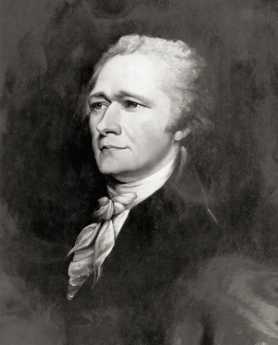
|
| Alexander Hamilton |
Although Alexander Hamilton's arresting slogan that "A national debt is a national treasure" has diverted attention to the underlying idea toward him, Robert Morris had introduced and argued for the same insight in the preamble to his 1785 "Statement of Accounts". The key sentence was, "The payment of debts may indeed be expensive, but it is infinitely more expensive to withhold payment." This fatherly-sounding advice was surely a distillation of a long life as a merchant, and the gist of it may have been passed down to him as an apprentice. Failure to pay your debts promptly and cheerfully results in the world assigning a higher interest rate to your future credit; it is not long before compounded interest begins to drag you down. It doesn't exactly say that, but that's what it means.
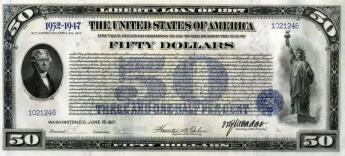
|
| Liberty Bond |
Another way of looking at this folk wisdom is that it leads to a simplified method of organizing the finances of an organization. Because higher rates of interest are demanded of long-term borrowing than short-term, it becomes efficient to segregate them. That is, to establish a cash account for every-day transactions, and a separate bond account for a long term, or capital, debt. As bills arrive, they need only be verified for accuracy and sent for payment from either a cash account or a capital account. The original responsibility for agreeing to such debts lies with top management, not the treasurer. The job of the treasurer's office is to pay legitimate bills as quickly and cheerfully as possible, ignoring any imprudence of earlier agreeing to them; rewards will come from lower interest charges and improved credit rating. An unexpected benefit of thus organizing institutions and governments is to make the accounting profession possible. Accountants perform the same function in every business, whether the business is selling battleships or parsnips. The accounting profession made itself computer-ready, two hundred years before the computer was invented.
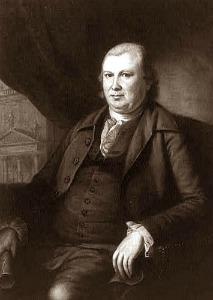
|
| Robert Morris |
In the same document, the retiring national Financier was advising the wisdom of "funding" the war debts, which were largely owed to France, with whom relations were rapidly souring. Lump them all together into a fund, issue bonds and sell them as representations of the nation's capital at the time of issue. Disregard what the money was used for, by either the debtor or the creditor. In spite of appearances, money sequestered in a fund for later payment belongs to the creditor the moment it is promised, not the moment it is transferred. Morris and Hamilton discovered that the fund itself had the property of a bank, in creating money. As long as the creditor did not cash your bonds, he could use them as money, in effect doubling the amount of money you yourself can spend. It was this discovery which so exhilarated Alexander Hamilton, causing him to over-praise the methodology to an already suspicious Congress. Tending toward the teachings of Shakespeare's Polonius, Hamilton's excitable manner caused them to remember, neither a borrower nor a lender is. But Congress was eventually persuaded. The federal government lumped the states' debts together in an "assumption of debts" , consolidated all these various little debts into a single "funded debt", and made the deal work with changing the "residency" of the nation's capital from Philadelphia to the banks of the Potomac. It was called the Great Compromise of 1790.
Morris well understood that a funded system requires some final payor of last resort. Such a payor need set aside only a small portion of the debt for dire contingencies, but his name gets first attention on the list presented to prospective creditors. In 1778 Morris had offered his own personal wealth as that last resort, which the public at the time trusted far more than the Treasury of the United States. Over the next twenty years, he came to realize that the last resort of established nations, no matter what the paper said, was the aggregate underlying wealth of the whole nation. With a vast continent stretching to the West, and countless immigrants clamoring to join from the East, the wealth supporting the debt of the United States in 1790 seemed endless. After two hundred years we have finally begun to accumulate a national debt which equals our Gross Domestic Product, and have only begun to pull back as we observe what happens to other nations who got to that point sooner. Let's hope devising an automatic check and balance does not require a second Robert Morris. Men like him can be hard to find, so limit your debts -- or your nation's debts -- to sixty percent of your assets. Financial geniuses are invited to devise a better debt limit, if they can.
Morris at the Constitutional Convention
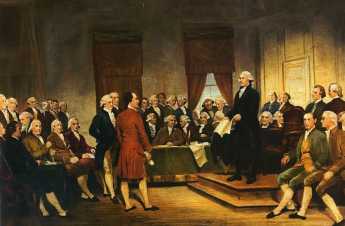
|
| Constitutional Convention 1787 |
TRUE, George Washington was the presiding officer of the Constitutional Convention. But Pennsylvania was the host delegation, so the role of presiding host should have fallen to Benjamin Franklin, the President of Pennsylvania. However, Franklin was getting elderly and turned the job over to Robert Morris, who among other things was rich enough to host some necessary parties. The rules of decorum at that time thus kept Washington and Morris out of the floor debates. The proceedings were, in any event, kept the secret, so occasional frowns or encouraging smiles are not recorded for history.
But Morris had been an active debater in the Assembly and other meetings, so he knew enough to line up a consensus in advance for the matters he thought were essential. Obviously, Morris was strongly in favor of giving the national government power to levy taxes for defense purposes, and Washington whose troops had suffered severely from the inability of the Continental Congress to pay them also regarded this taxing power as the central reason for changing the rules. By making it the central argument for holding the convention at all, Washington, Franklin, and Morris had made taxation power a foregone conclusion. And by giving them what they wanted from the outset, the rest of the convention was in a position to do almost anything else it wanted without open comment from the Titans. The sense of this trade-off was captured by Gouverneur Morris, the editor of the Constitution, in Article I, Section 8:
The Congress shall have Power To lay and collect Taxes, Duties, Imposts, and Excises, to pay the Debts and provide for the common Defence and general Welfare of the United States; but all Duties, Imposts, and Excises shall be uniform throughout the United States;This formulation had the effect of greatly empowering James Madison, the only participant who had studied the inside details intensively and cared about every comma. It also encourages the military to believe that federal taxation was mainly their entitlement, whereas those whose main goals are defined as "the general Welfare" tend to regard defense spending as an unnecessary deduction from their share.
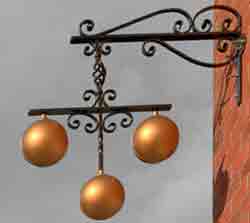
|
| Pawn Broker Sign |
Most of the convention delegates had experience with state legislatures, and Franklin and Morris had spent decades struggling with the weaknesses of legislators. A wink or a quip in a tavern was as good as an hour's speech for reminding the delegates what they already knew about human nature. What was designed as a dual system of powers of taxation, with federal oversight of balanced state budgets combined with federal power to tax on its own in emergencies or unforeseen situations. Since the members of the first few congresses after 1789 were largely the same people as the members of the constitutional convention, many details of this balance were worked out over a few following years. State powers to tax and borrow were tightly constrained, only the federal government could tax and borrow without limit. Since government borrowing is merely the power to defer taxes until later, the borrower of last resort was the U.S. Congress, alone empowered to encumber the wealth of the whole nation in a federal pawn shop window called the funded National Debt. For almost two centuries, this pawn shop window seemed able to support any imaginable expense. Today, we monitor this as the ratio of national debt to Gross Domestic Product (GDP), and we now have a clearer idea what level of that ratio flirts with hopeless inability to pay the federal government's debt. The experts say it's close to a 60% ratio, and unfortunately, almost every nation on earth now exceeds that limit. The system continues to lack an unchallenged definition of its limit, but the system is nevertheless still Morris's system, wrapped in a mountain of descriptive detail by Alexander Hamilton. If a nation borrows more than that and clearly will never repay it, that nation is to some degree a slave to its creditors, with war its only hope if creditors are unrelenting. Perhaps another way to refine the thought is to say that if the nation wishes to mortgage everything it owns down to the last shoe button, the creditors will only accept additional debt if it is proposed by someone with the power to pawn the last shoe button. To foreigners, the proof of who has what power is much more certain if written down. Morris's protege Alexander Hamilton went even further: "credit" is established when creditors can see that somebody is in the habit of getting the nation's bills paid, and "credit" is injured whenever anyone in charge, welches.
Our Federal Reserve : Biddle's Bank (2)
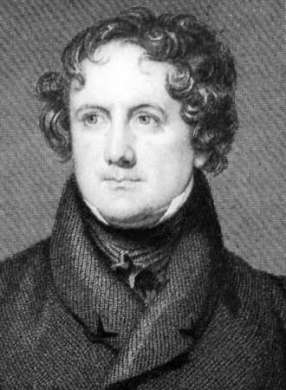
|
| Nicholas Biddle |
In 1823, the Biddles were prosperous, having made money in real estate (a Biddle ancestor had been a member of the Proprietors), and influential, having been Free Quakers who sided with the Revolution. So, Nicholas Biddle became the president of the Second Bank at 4th and Chestnut. Like all banks, he was given the ability to create money by taking deposits and loaning them out. Since in this process, two people (the depositor and the borrower) think they have the same money, there is effectively twice as much of it -- unless both actually demand it at the same time. If a bank has Federal revenues on deposit, as Biddle did, it is fairly easy for a politically active banker to predict whether that large depositor is likely to withdraw it. Political deposits seemingly make a bank stronger and safer, unless the banker has a fight with a politician. That's banking, but Biddle also became a central banker.
Biddle had ideas, derived in part from Alexander Hamilton. In those days, banks issued their own paper currency, or bank notes, representing the gold in their vaults or the real estate on which they held mortgages. There was a risk in one bank accepting bank notes from another bank that might go bust before you changed their notes into gold. The further away the issuing bank was, the riskier it was to rely on it. So, it was important to be a friendly sort of banker, who knew a lot of other bankers who would accept your money or who were known to be trustworthy.
Nicholas Biddle himself was well known to be pretty rich, and utterly trustworthy. He had a good instinct for how much to charge or discount the banknotes from other banks, or even other states. It was quite profitable to do this, but it became even more profitable when people began to use Biddle's own bank notes because they were safe. By setting a fair standard, he could control the exchange rate -- and hence the lending limits -- of banks that dealt with him. Sometimes a distant bank would get into cash shortages, and Biddle would help them out; if the other bank had a bad reputation, he might not.
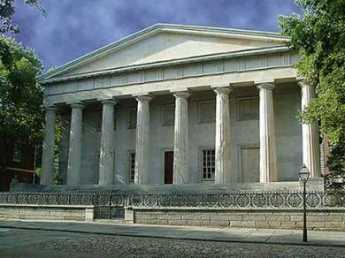
|
| Bank of the United States |
In this way, the Second Bank was a reserve bank for other banks, with its banknote currency coming close to being the currency for the whole country. Soon, within a few blocks of Biddle's Bank, there were dozens of other banks, making up the financial capital of the country. Although it was a little obscure, and even Biddle may not have completely realized what he was doing, in effect his system automatically adjust the amount of currency in circulation to the size of the economy. If the correspondent banks prospered, they issued more currency, and if there was a recession, the country had deflation. The volatility of this system was related to the volatility of a pioneer economy, so Biddle made lots of enemies whenever he guessed about the direction of the economy. It wasn't a perfect system, but at least he kept politicians from inflating the currency to get re-elected, and hence annoyed politicians by constraining them. During the great western land rush of those days, all banks were under pressure to issue more loans than was wise, and politicians were under pressure to make them do so.
The worst enemy Biddle made was Martin Van Buren of New York. Van Buren was a consummate politician, one of whose many goals was to move the financial capital of the country from Chestnut Street--to Wall Street.
REFERENCES
| America's First Great Depression: Economic Crisis and Political Disorder after the Panic of 1837 Alasdarir Roberts ISBN-13: 978-0801450334 | Amazon |
Our Federal Reserve: Okayed (3)
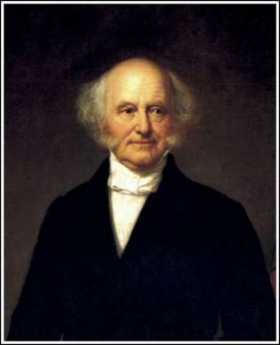
|
| Martin van Buren |
The 8th President of the United States, Martin van Buren, was born in Kinderhook, New York along the Hudson. He was known as "Old Kinderhook", so in time he initialed his documents "OK", and that's how that slang term originated. It's also of note that his retirement home in Kinderhook was named Lindenwald, although any connection with the terminus of the PATCO high-speed line is unclear. His real claim to fame is that he sort of invented what we know as the a modern political system, particularly that unfortunate doctrine known as the "spoils system". The full allusion is "to the victor belongs the spoils". The two-party a system, the Democratic Party, spinning, log-rolling, and other clever manipulations were of his devising. He must have been pretty shrewd, having defeated De Witt Clinton for Governor of New York, when Clinton was known as one of the most ruthlessly ambitious politicians around. Recognizing he was unlikely to be elected President, van Buren took on Andrew Jackson the war hero and manipulated him into the presidency, with the clear understanding that when Jackson stepped down, van Buren would have the job, next. Van Buren was a cabinet officer during Jackson's first term and Vice President during the second term. During that time, he was the real power running things from the shadows. He ruined the careers of John Calhoun and Henry Clay, regularly taking both sides of a number of disputes over the extension of slavery into new Western territories. What people ultimately thought of all this may be judged from the fact that he ran unsuccessfully for re-election -- three times.
It is therefore not certain just whose ideas were in operation when Jackson blocked the re-chartering of Biddle's bank, but one main benefit, "cui bono?", went to New York. Wall Street had sold stocks under a Buttonwood tree for fifty years, but its real start in the the financial world can be traced from Jackson's action.
The Industrial Revolution and the expansions of the United States by the Louisiana Purchase, the annexation of Texas and the Mexican acquisition caused an an explosion of new wealth, and hence an urgent need to make some better financial alignment of three asset classes: land, precious metals, and currency. Everywhere and at all times it is arguably what the land is really worth; 19th Century America it was particularly speculative, because there was so much of it. Most of the many bank waves of panic during that century can be traced to excessive borrowing to speculate in raw land. When Jackson closed Biddle's reserve bank, the land the speculating public was ecstatic because of any constraints on the lending power of banks made it harder to sell real estate. But what had been done was to eliminate the only reasonably effective way of matching the a true wealth of the country with its circulating monetary assets, and after a brief boom, the almost certain consequence was going to be a national bank panic. It came in 1837, during the first year of Martin van Buren Presidency.
The only imaginable alternative to a market-based monetary system is a government-based one. Van Buren's political behavior was by almost by itself sufficient warning of the danger of allowing politics into this matter. For nearly a century, one warning was enough.
Premature Solutions to the Credit Crisis of 2007

One of the things being said in Academia in 2008 is that the 1929 crash was the result of many futile attempts to preserve the gold standard. That's the first time that particular formulation has surfaced in eighty years. It may not be correct at all, and even if correct it doesn't say what should have been done about it. Life is short and the Art is long, but somebody must do the best he can with the information available. Unemployment was over 30% in those days, and hundreds of Americans froze to death in the Depression because they could not afford to heat their rooms. Right or wrong, there are times when some action must be taken. But if you can possibly sit tight and figure out a sensible thing to do, it's certainly better.
So, we hear proposals from Henry Kaufman to create a separate Federal Reserve for big institutions alone, while others say banking oversight is already too fragmented between the Fed, the Controller of the Currency, the Secretary of the Treasury, the FDIC, state banks and national banks, the SEC, the Bureau of Management and Budget, and on and on. This line of argument takes the formulation that we should regulate mortgages, no matter who is involved in them, rather than banks, on non-bank institutions. On one point everyone is in agreement, that we need more information more quickly, more transparency, less asymmetry of information. At the same time, everyone is aware that it probably will eventually be possible to describe this whole mess on one sheet of paper; the truth is totally hidden by information overload. Don't talk so much; say something.
At the GIC (Global Interdependence Center) recently, a brilliant professor of the Wharton School gave a magnificent summary of the situation, now nine months old, enumerating a number of insights which had not even occurred to an audience of bankers and businessmen. They applauded enthusiastically, and then someone asked how Credit Default Swaps fit into this picture since they had not been mentioned. It immediately became embarrassingly evident that the professor knew almost nothing about that topic beyond a couple of pat sentences. But Credit Default Swaps now total trillions and trillions of dollars, more than doubling in a year. Since they are private transactions unreported to regulators, no one has measured the matter or will divulge what has been measured. But since they represent a volume several time the size of the underlying debt market, and every swapper swaps with someone else, it seems inevitable that huge imbalances exist somewhere. It would be nice to have a general idea out of whose pockets the excesses come, and into whose pockets they go. Maybe all this is irrelevant to the present crisis, but it isn't irrelevant to the distrust and fear in the markets. If someone proposes a law about this situation, he had better have divine guidance.
An example of what causes markets to freeze up because people are afraid to buy, comes from an anonymous person in an elevator. Speeding between floors, he remarked earnestly to a friend, that when he worked for Goldman Sachs his department churned out dozens of innovative debt instruments. If one of them happened to get popular, then and only then did they set about devising ways to measure them, and adjust the prices. It's impossible to stop rumors of this type because they sound so plausible. In fact, they may even be true.
In fact, some of the most incisive comments come from people with no insider information at all. Such as a businessman who listened intently to the lecture and then called out, "Where were the accountants in all this? Aren't they paid to know what is going on?" The answer was that FASB rules should be tightened up. Maybe so, but it sounds a little thin.
The political risk is considerable. Only 6% of the population is old enough to remember 1929 and its aftermath, only 25% more can remember 1973, and 25% more can remember 1991. That means that nearly fifty percent of the public can never remember a severe recession at all. A politician running for office could tell them anything, and they would have no reason to challenge it. Or put it this way: the advisors who elected a young President could tell him anything, and it isn't certain he would fire them for it.
Macroeconomics of The 2007 Collapse
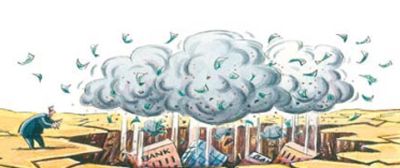
Sudden wealth creation, whether from the discovery of gold or oil, the conversion of poverty into useful cheap labor, or the sudden abundance of cheap credit, is of course a good thing. Sudden wealth creation can be compared with a stone thrown into a pond, causing a splash, and ripples, but leaving a somewhat higher water level after things calm down. The globalization of trade and finance in the past fifty years has caused 150 such disturbances, mostly confined to a primitive developing country and its neighbors. Only the 2007 disruption has been large enough to upset the biggest economies. It remains to be seen whether a disorder to the whole world will result in a revised world monetary arrangement. One hopes so, but national currencies, tightly controlled by local governments, have been successful in the past in confining the damage. This time, the challenge is to breach the dikes somewhat, without letting destructive tidal waves sweep past them. Many will resist this idea, claiming instead it would be better to have higher dikes.
It is the suddenness of new wealth creation in a particular region which upsets existing currency arrangements. Large economies "float" their currencies in response to the fluxes of trade, smaller economies can be permitted to "peg" their currencies to larger ones, with only infrequent readjustments. Even the floating nations "cheat" a little, in response to the political needs of the governing party, or, to stimulate and depress their economies as locally thought best. All politicians in all countries, therefore, fear a strictly honest floating system, and their negotiations about revising the present system will surely be guilty of finding loopholes for each other; the search for flexible floating will, therefore, claim to seek an arrangement which is "workable".
In thousands of years of governments, they have invariably sought ways to substitute inflated currency for unpopular taxes. The heart of any international payment system is to find ways to resist local inflation strategies. Aside from using gunboats, only two methods have proven successful. The most time-honored is to link currencies to gold or other precious substances, which has the main handicap of inflexibility in response to economic fluctuations. After breaking the link to gold in 1971, central banks regulated the supply of national currency in response to national inflation, so-called "inflation targeting". It worked far better than many feared, apparently allowing twenty years without a recession. It remains to be investigated whether the substitution of foreign currency defeated the system, and therefore whether the system can be repaired by improving the precision of universal floating, or tightening the obedience to targets, or both. These mildest of measures involve a certain surrender of national sovereignty; stronger methods would require even more draconian external force. The worse it gets, the more likely it could be enforced only by military threat. Even the Roman Empire required gold and precious metals to enforce a world currency. The use of the International Monetary Fund (IMF) implies attempts to dominate the politics of the IMF. So it comes to the same thing: this crisis will have to get a lot worse, maybe with some rioting and revolutions, before we can expect anything more satisfactory than a rickety negotiated international arrangement, riddled with embarrassing "earmarks". Economic recovery will be slow and gradual unless this arrangement is better, or social upheavals worse, that would presently appear likely.
Federal Reserve Rolls the Dice
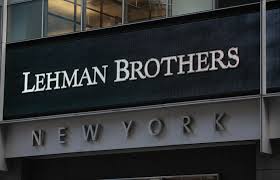
|
| Lehman Brothers |
For the year preceding, it was general opinion that the financial crisis was caused by $100 billion or so of mortgage-backed securities, mostly California and Florida home mortgages. But around Labor Day 2008 Lehman Brothers collapsed, and the problem became twenty times as large. What that was about is unclear, but seemingly had to do with money market funds being treated as "funds in transit" in consequence of the international monetary agreement known as Basel I, and thus not requiring bank reserves to be maintained for them. It will take time to unravel the intricacies of, and assign the blame for, this mess. However, the markets responded by refusing to trade at now uncertain prices, thus "freezing up". The response of the Federal Reserve was to double the money supply through international markets, mostly using "Central Bank liquidity swaps". The participation of various countries in this action has not been made public.
The doubling of the money supply required borrowing between one and two trillion dollars. After five months, or just after the inauguration of the new Presidential Administration, the markets had seemingly started to function more normally, and the stock market had rallied somewhat. The obviously bewildered leadership of both political parties agreed to the proposal to purchase $1.75 trillion of the troublesome assets, taking them off the market and presumably hoping the markets would function as if they did not exist. By July 2009 this operation was only about half completed. Not only was there disagreement about what these securities were really worth, but the banks which held them were reluctant to allow prices of what they continued to hold to be driven down by comparison with these forced transactions.

|
| Federal Reserve Bank of Philadelphia |
In any event, the second stage of this huge government bailout of the banking system is projected as follows: The portfolio of assets would be worn down, either by allowing debts to mature, or by selling them at what is hoped will be advantageous prices. Who will buy them is to some extent dependent on the state of the economy, and to some extent on the perception of the fairness of the pricing. The Federal Reserve Bank of St. Louis has been assigned the task of designing a public formula for how much to buy or sell, depending on selected indicators of the economy. A public formula is felt to be necessary in order to reassure the markets that purchases and sales are not being made in response to secret information or unsuspected problems.
The reasoning would be that if these assets are sold to speculators at fire-sale prices, the money supply will shrink inappropriately, and the recession will be prolonged by the need to borrow replacement reserves for the monetary system. Unduly profitable sales would probably lead to inflation, since the present level of monetary reserves is twice as large as was thought appropriate, as recently as a year or two ago. But this maneuver by a central bank has never been tried before, and the results may well differ from present predictions. The Federal Reserve is prepared to take as long as ten years to accomplish the complete maneuver, but that plan presumes ten years of recession and five congressional elections. It also implies that the economy could swing between 7% annual inflation, and 7% annual deflation, in the two worst cases, and assuming nothing extraneous happens to the economy.
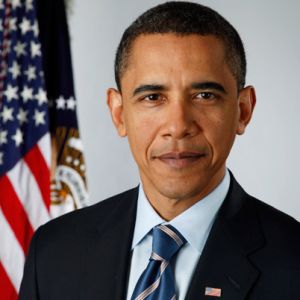
|
| President Barack Obama |
In the meantime, two other ominous notes. Although the nationalities of the lenders have not been made public, one can safely assume the Chinese are a major component. Since they are refusing to lend us money beyond two, and at the most five, years, we would be indefinitely in the position of borrowing short and lending long. In other situations, that imposes a risk of depositors starting a run on the bank. And secondly, it is hard to imagine that Mr. Obama's presently ambitious programs in healthcare, environmental protection, two wars and several election cycles, will be allowed to proceed without enormous public resistance to even further fiscal deficits.
After a Year of Crisis, Fannie and Freddy Finally Get the Spotlight
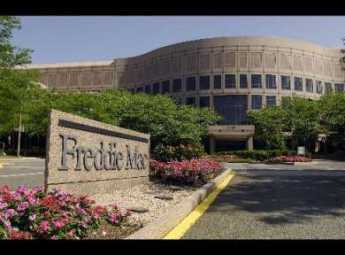
|
| Freddie Mac Corp. |
A year after potential financial collapse burst on the scene, the public (and Congress) are beginning to understand what collateralized debt obligations (CDO) are, and how Fannie Mae and Freddie Mac work. It begins to seem they are much the same thing in different clothes, that securitization of mortgages began with Fannie Mae if not Farm Credit in 1916, and that these bewildering new Wall Street CDO creations are just new variations of an old idea. The devil, as always, is in the details.
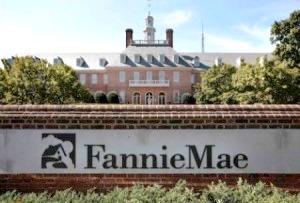
|
| Freddie Mac Corp. |
Originally, Government Sponsored Enterprises (GSE) began in 1916 with the Farm Credit System and entered the home mortgage secondary market in 1938 with the creation of FNMA (Fannie Mae). Populist in the first case and Depression-fighting in the other, the idea was that third-party reinsurance would make mortgages safer, and thus lower interest rates for a favored population segment (farmers and homeowners). Although no promises were made to bail out failing loans, GSEs eventually grew large enough to seem able to force the government to rescue them in the event of failure. They were claimed to be "too big to be allowed to fail". In addition to this implicit government backing, there was a twist created by making debt interchangeable with equity. "Securitization" was a process of bundling many mortgages into a package sold to the public as a stock issue. Since FNMA was a creditor, rising interest rates created profits for the shareholders, while falling interest rates depressed share prices. Steady predictable mortgage prices could be offered to homeowners, while the risk was transferred to the shareholders. To a certain but much lesser degree, some of the risks of falling real estate prices were transferred to the shareholders as well. Finally, the reduced risk in this arrangement led to lower prices for mortgages, regardless of the state of the economic cycle.
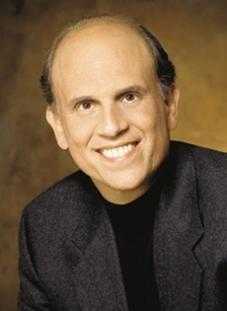
|
| Michael Milken |
To some unknowable degree, enthusiasm for mortgage-backed securities in the private sector was enhanced by fear or even loathing of government involvement in the financial system style of banana republics or the Weimar Republic in 1922. To compete with the lower interest rates of government-backed security, the efficiency of the private sector could be combined with innovations made possible by the computer. Mathematical models were devised to calculate mortgage interest rates by working backward from the default rate in a huge universe of mortgages. During the savings and loan crisis two decades earlier, Michael Milken had promoted the idea that prevailing interest rates on mortgages were higher than were justified by the prevailing rate of default in a large pool. If the uncertainty of risk for a single mortgage could be submerged within the fairly certain risk of a large pool, it should be possible to offer generally lower prices than even those of the government-backed GSE system. In spite of the recent panic, the reasoning behind both systems, government and private, seemed to suggest that securitization of debt continues to be a sound idea.
What appears to have been unanticipated was that house prices would rise in a bubble stimulated by a flood of money from the Far East and the Middle East. When that bubble inevitably burst, the resulting drastic decline in house prices would trap everyone who had borrowed a fixed amount as a mortgage at the top of the real estate market. Those who bought and held their houses before 1980 could ride out the gyrations of the real estate market, but everyone who bought an overpriced house after that was at risk that prices would eventually return to normal -- and bankrupts them with that high fixed debt. If these people outnumber the rest of the country, they can use their voting power to force the rest of the country to bail them out, but that's the way civil wars get started. It remains to be seen whether some political compromise can be arranged between those who bought houses at foolish prices, those who felt enriched by owning more valuable houses, and those few who watched with dismay.
Meanwhile, there is another important decision to be made, as to whether to permit either form of securitization to be used as an American scapegoat for a mess caused by Chinese prosperity. There is indeed much to be criticized in retrospect about the conduct of Main Street, Wall Street -- and K Street.
A Single International Currency?
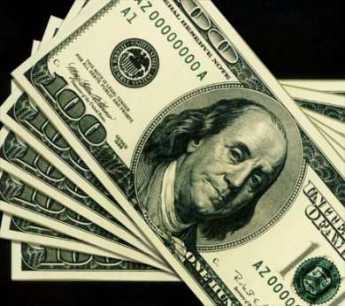
|
| It's Only Paper |
The Economist, printed in London, refers to the United States in its October 17, 2011 edition as the "World's largest currency union", but goes on to state it only became a true currency union in the Presidency of Franklin Roosevelt. That's sort of the case, even though most people suppose Alexander Hamilton unified American monetary affairs with the Compromise of 1790 which among other things traded the nation's capital away from Philadelphia. No, Hamilton only unified the Revolutionary War debts, which to be sure, at that time were the main debts of the new nation. In time, the country and the economy grew in size until our currency was no longer unified because the individual states and banks were legally free to issue their own money. Nicholas Biddle of the Second National Bank had an irritating habit of buying up the circulating currency of a weak bank and presenting it as a bagful to the teller's window. If the bank was really overextended, it then went bankrupt, and other marginal currency-issuers could observe a bitter stress test about printing unreserved paper money. According to The Economist, the main stabilizer was not a migration of money, but the migration of workers. Unemployed people by the many thousand would move to a state or territory with a labor shortage, a solution made practical by the extremely low cost of real estate. In Europe, a far more practical adjustment remains the moving of funds from one state to another, although there is today enough migration across the Mediterranean to demonstrate how disruptive it is to mix extremes of unwelcome language, religion, and culture. In comparing the American and European experiences we thus have two quite different systems to compare, although distinctive conditions often bring out the main issues. The problem of maintaining a common currency union, for example, is hard enough, while the Europeans have the similar but not identical problem of devising a stable one from a large number of different ones.
After three hundred years of fumbling America has perhaps muddled through to a currency union that works. Resting on the fact that most Americans are either debtors or creditors and the rest mostly don't care, the quantity and value of American dollars since 1913 have been negotiated between banking and the U.S. Treasury with the Federal Reserve as umpire. During that last century we have endured two major depressions and a dozen recessions, abandoned the gold standard and fought a number of wars; but the American currency union has never given serious signs of weakness. It would appear that the main problems with currency unions appear at the beginning, in putting them together. After the transition, things appear to get easier. Bank profits are improved by higher interest rates, while all governments, perpetually in debt, want lower ones. Ultimately, of course, the real tension is between the creditors and debtors, but banks and Treasury seem adequate surrogates. Most creditors place trust in the incentives of banks to prevail, debtors trust government; both sides should have learned trickiness in endless negotiations is futile. What was once a battlefield, is now mostly peaceful; these people actually respect each other. Many people may occasionally dislike an outcome, but all acknowledge the tension produces legitimate compromise.
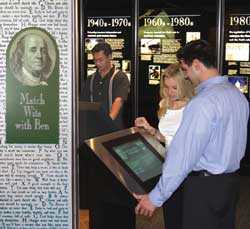
|
| Match Wits with Ben Franklin |
Aside from some "don't ask, don't tell" mystery that somehow compels assent by regions of the country who feel betrayed by agreements their representatives have made, negotiating postures are pretty simple and clear. It is safely assumed the government wants to inflate; all governments have done so for thousands of years. Therefore, the basic Federal Reserve policy of targeting interest rates to restrain inflation is probably a concession to banks. Banks would mostly want the highest rate that does not cause a recession. Debtors do not mind lower rates leading to just a little inflation, hoping to pay off their debts later with cheaper money. Government, acting as an agent for debtors, additionally knows that rampant inflation loses elections and occasionally, as in inter-war Germany and Austria, destroys the middle class. So, with everyone else resisting inflation, debtors must be satisfied with 2% annual inflation. That's arbitrary, reflecting its origin in the haggling process. Inflation-targeting plus two percent; that's the system.
If only there weren't all those other countries in the world. If they inflate or deflate, we could just float our currency exchange rate to maintain international trade; that isn't so bad, although frequent readjustment of prices is a costly nuisance. But if some country freezes its currency at an unrealistic price, speculators will move money around to take advantage. Enter Gresham's Law (commonly expressed as "Bad money drives out the Good".) Gresham's original phrasing is actually apter: "When two currencies of unequal value circulate together, the good currency quickly disappears." So, when truant governments cheat on currency values, well-behaved countries find their own currency getting hoarded. Potentially, that leads to currency shortages, as happened to Argentina when Brazil devalued in 1999. So, countries running an honest currency nevertheless feel pressure to print more; Brazil "exported its inflation" to Argentina. Plenty of wars have been started for less provocation. When something causes that extra money to come out of hiding, there will be spreading inflation, notwithstanding attempts to isolate foreign inflation by the central banks of more responsible nations. Furthermore, runaway inflation can unsettle governments, as it did in the Argentina example, going from one extreme to the opposite. There is thus wide-spread sympathy for currency unions, even though locally independent currencies can sometimes better adjust to local commotions, typically by devaluing the currency and then rejoining the currency union at a more realistic price. The Federal Reserve in our case would be forced to raise interest rates sky high, promptly triggering housing and stock market crashes. So the point returns; if our Federal Reserve system works so well, why can't everybody does the same thing on an international level. In fact, what's the matter with having one big world currency?
Maybe, some say, we could have a World Reserve Bank, issuing a common international currency. What we now have in place is U.S. money serving as a Reserve Currency for the world. The force behind this system is again Gresham's Law, that since we have the strongest currency in the world when it circulates in other countries in the company of weaker local currencies, it quickly "disappears". That is, it is hoarded out of sight until nothing but local money remains visible. Under these circumstances, only the United States with the world's Reserve currency is able to print money without creating inflation. Unfortunately, that implies that if it should ever weaken, it will quickly reappear and flood the host country with inflation, whereupon the host government will ship it all back to enjoy your own inflation, thank you. Thus, being the reserve currency for the whole world allows you to have some inflation and ship it abroad, but if it ever comes back home, there could be a painful disruption. The last time this happened was when the British Pound surrendered the reserve role to the American dollar. It was a bad time for the British economy.
The question periodically arises whether it might be better to use a "basket" of currencies as the reserve against temporary monetary shortages, with the United States trading away some of its free ride on inflation in return for reducing the risk of someday getting it all back at once.
Using a basket of everybody's money as a pool of international reserves might smooth out the tidal waves, but it probably would not create the same stability from tempests we enjoy with the Federal Reserve. If you regard a country's money supply as one big short-term bond, then a basket of currencies is a basket of bonds, issued by a world full of debtors. In that situation, pressure for worldwide inflation is inevitable. In a world with nationalized banks and/or subsidized banking systems, it is hard to imagine any international banking voice without a strong political component. Mandatory contributions of gold bullion might be considered, but it is hard to think of an adequate substitute for the flexibility of adversary tension between permanent creditors and permanent debtors. The situation is not permanently hopeless however, just remote. The enduring risk is that some nations always have more to lose from a collapse of trade than others. Continuing improvement in world economic conditions may one day make a unified world currency feasible. As St. Augustine famously said, "Make me chaste, but not yet."
REFERENCES
| Runaway America: Benjamin Franklin, Slavery, and the American Revolution, David Waldstreicher ISBN-13: 978-0809083152 | Amazon |
European Common Currency

|
| Christian Noyer |
Philadelphia had the recent pleasure of a visit by Christian Noyer, the Governor of the Banque de France, offering to a Federal Reserve Bank audience a view from inside the Eurosystem's monetary policy. Mr. Noyer was a designer of the Euro, or common currency of Europe. A charming and polished man of education, he brought along a document which hangs in his office, dated June 5, 1779, signed by John Jay on behalf of the Continental Congress, sent to Benjamin Franklin to give to Caron de Beaumarchais. Since Independence Hall is visible from the upper windows of the building where he was speaking, it was a charming touch.

|
| European Central Bank |
The European financial system consists of one monetary policy, set by the European Central Bank, but twelve (soon to be twenty-five) fiscal policies, set by the various governments. This was once thought to represent a major difference from the American Federal Reserve, but in fact, it hardly matters. Our fifty component states are not permitted to run deficits, but our federal government runs deficits, plenty of them, and it turns out to make little practical difference if a Central Bank must float bonds to pay for a deficit arriving in one envelope or twelve. What matters is the size of the total. From that starting point, the central bank struggles to modify matters to restrain inflation, or combat unemployment. The main tool at the bank's disposal relates to the fact that governments no longer fear to print more money than they can redeem in gold. They print money, all right, but the spigot is now turned down when inflation begins to appear. In theory, at least, inflation is not possible if the central bank is able to maintain this policy. Of course, if money created in the past comes flooding in from abroad or out of mattresses, there might be a problem. Central bankers seem like terribly powerful people until you count up the people they can't control. The first is the politicians who create those deficits.
European politicians believe their constituents prize security above all else, a condition known as socialism. High taxes, high unemployment, and slow economic growth are considered more tolerable in Europe than sacrificing pensions, health care, and other features of the social safety net; out of this come government deficits, then maybe inflation. The central bank is told to make the best of it.
Then, there is the long-term bond market, which in the past responded to a flood of money by reducing the value of outstanding bonds, which results in higher interest rates.

|
| Euro |
Recently, however, long-term interest rates have failed to rise in response to rising deficits, and speculation abounds as to why that should be so. It creates uneasiness to hear that the finances of the world are simply a "conundrum". And finally, foreigners will flee from an inflated currency, eventually triggering a devaluation. A few years ago, Argentina refused to devalue, but the result was a devastating recession when their foreign trading partners refused to deal with an unrealistic currency.
A government which refuses to respond to these "signals" from the bond market and foreigners, will be forced to take some undesirable actions. In Europe, it is to oppose globalization of the economy, thereby hurting everybody but especially poor nations. And the internal European unemployment is shifted as much as possible onto the backs of immigrants, even migrants from within the European community. Take that far enough, and you get serious threats to world peace. Even within the European community, many of the policies which protect the welfare state will consciously injure their own economic growth. Reform is resisted.
Many needed reforms are obvious to policymakers in Europe, and the American example would often seem to be convincing. But it isn't, because Europeans terrified of losing their welfare state recognize that the American model includes a large amount of contempt for socialism, no matter how otherwise successful it is. The interesting thing has been that the Scandinavian countries have an equally extensive welfare safety net, but have nevertheless prospered by adopting free-market reforms. There are signs that this experience is beginning to convince Europeans it is possible to work their way out of the dilemmas.
After his talk, which avoided mention of many of these concerns in the mind of his audience, Governor Noyer was even more charming in cocktail-party mode, but one thing made his face turn beet red. When asked what the John Jay letter was all about, he had to admit he hadn't the foggiest. It was just something hanging on his wall that seemed appropriate for a trip to Philadelphia.
Euros and Dollars
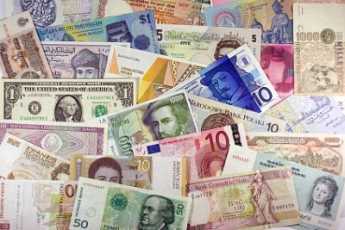
|
| International Money |
The United States government issues lots of different currencies. We issue ones, and twos and fives and tens and twenties. If you need more one dollar bills, you can walk into any candy shop with a five and the shopkeeper will more or less cheerfully make the exchange without charge. But if you want to change the same five dollar bill for euros, yen or drachma, you need to find an agent in a kiosk and pay a fee of about 3%. The booth or shop of the international money changer will have some sort of electronic means to tell what the rate of exchange might be at any given moment. To extend this idea, if the people at the mint run short of ones, they just print some more, meanwhile removing a comparable number of surplus fives from circulation. No matter how extreme the imbalance, it does not affect the price of dollar bills. That's more or less the idea behind the common currency in Europe and a major success. All countries of Europe want to join, nobody wants to leave.
But some things are lost in this obvious simplification of financial transactions; it has enemies. For one thing, the Federal Reserve or other central bankers can change interest rates instantly, but the rest of the economy has a certain amount of inertia. For example, banks typically deal in 90 day Treasury bills, so it takes them a month or two to catch up with the Federal Reserve as the old bills mature; in the meantime, they lose money. Almost all businesses have even longer legs than that. So during the lag periods, the national economy experiences inflation or deflation, which may represent the national interest at the moment, but in time things catch up and rebalance about the way they were before the central bank acted. Except for taxes, that is, and this specific attrition is one of the main arguments for eliminating the capital gains tax, or extending special allowances for banks and others who have short-term gains on price changes without effect on underlying values. The matter gets mixed up in domestic politics. Incumbents long for short-term inflation, nonincumbent challengers denounce it. Everybody welcomes a "strong" currency, everyone recognizes that a weak currency sounds pretty bad. Few, however, could defend their opinion. The people who benefit are the ones who can move fast, because there's usually a brief flurry of inflation or deflation, and then things go backward. People who can move huge amounts of money quickly are apt to make big mistakes in their hurry.
And so it is in the eyes of foreigners. Right now, the American tourist to Paris confronts a taxi charge of $120 for a twenty-minute ride from the airport to the downtown. Everything else, from thirty dollars continental breakfast to two hundred dollar dinners, seems comparably overpriced. Tourists with sticker shock return home to tell their friends all about it, just before the November elections. No doubt it has an opposite effect on Parisian shopkeepers and their acquaintances. But the tourist trade is comparatively minor, compared with major industries. Airbus was once giving Boeing a seriously competitive race for airliners, but now Airbus is contemplating possible bankruptcy if currencies do not soon readjust, and Boeing is laughing all the way to the bank. Stop a minute and consider what happens when you buy and sell a whole company. Now it's the reverse, and a group of European investors is considering buying Anheuser Busch, the largest American brewery. The producer of Budweiser beer seems extremely cheap to Europeans, just as the beer itself is cheap for European beer drinkers. And then just consider a personal note: the wife of Senator McCain, running for President, owns a huge chunk of Budweiser distribution. The pillow talk in that family is likely to focus on the unfairness of hostile foreign take-overs.
So, all in all, tinkering with the currency as a direct or indirect consequence of a banking crisis caused by overbuilding houses in the sunbelt, has potentially fearsome consequences. They must be added to effects on commodity prices, and revolutions in the banking system. Those two issues are next to be considered.
As Computers Displace Money, Trust But Verify

|
| The honking of the Horn |
The Internet has made computing power ubiquitous. No longer need individuals to be at the mercy of institutions with whom they do business. However, new habits are hard to learn, so individuals still hesitate to challenge institutions. Sophisticated but inexpensive software from companies like Intuit nevertheless makes it nearly effortless for humble customers to have every bill and transaction cross-checked for them, and actually, in the resulting arguments. Its high time balance was restored because computers do send out lots of errors which have the effect of creating or destroying wealth. Indeed, much of the current credit muddle grows out of abbreviated records systems, organized for the convenience of only one party in a transaction. The transaction system would be streamlined, not hampered, by more adversary challenge and cross-verification at the level of individual items rather than merely cross-footing the totals. Indeed, add the filtering of information by third-party intermediaries, plus monitoring by regulators, and a need for some defined fault-tolerance emerges from the hopeless complexity. We must restructure relationships to ensure that small errors are trapped and isolated, not allowed to aggregate to a point where a mysterious failure of the books to balance can bring enormous systems to a halt. In this article, we mention the vulnerability of banks, financial derivatives, the Federal Reserve system, and the health insurance system. If everything worrisome went wrong at once, it could be quite a mess.
For the opening example, this article was written two days after the author discovered a sizable error in his stock brokerage reporting. It was in my favor, else I might sound less relaxed. Even so, the condescending stone-walling encountered was a powerful warning, since at the end of the day it proved to be entirely the fault of a software vendor for several brokerage houses. A few decades ago, a housewife would have been in a stronger position with her department store billing department because it was effective to refuse to pay the bill. Just try that today: the current practice of employing vendors to handle merchant billing soon separates the dispute from the circumstances of it. That's an underlying difficulty with all third-party arrangements; expedients selected to avoid a problem often make matters even more frustrating for the defenseless counterparty, who eventually longs for government intervention.
To a certain extent, customers have been forced to agree to this situation voluntarily, because of the mind-boggling complexity or greater cost of not agreeing. Until about fifteen years ago, it was conventional to place engraved stock certificates in a safe deposit box. Dividends were received as paper checks, endorsed and deposited in a bank. The bank microfilmed the checks, the customer could photocopy them.

|
| Form 1099 |
Power was then reasonably symmetrical, arms-length and simple in concept even if overall it was an expensive, inefficient transaction. A mountain of receipts, a quarterly blizzard of mail. At tax time, an error-prone chore to manage the papers. So, in response to the gentle suggestions of tax accountants, it seemed heaven-sent to take certificates out of bank vaults and place them in "street name" with a broker. Tax time condensed to attaching a single piece of paper, the Form 1099, to the tax form. Instead of calling a broker and asking, "How's the market?" people now go to his website and review how a whole portfolio is performing, hour by hour. The efficiency gain is enormous; the transaction cost reduces at least 90%. But then -- you discover seven-figure errors can be created by an invisible computer programmer, initially denied as impossible and then defended with a blizzard of words. Worse still, the error did not come from an employee of the broker, it came from an employee of his software vendor in another city. The error did not surface in the brokerage house records, but in what was transmitted to a second software company a continent away, whose phone is answered in India. Two questions arise: what would have been the predicament if the error had been against me instead of in my favor? And secondly, what might have happened next if the misinformation about my imaginary windfall had been sent, not to a software house, but to the Internal Revenue Service as a Form 1099?
Now think of another order of magnitude. Instead of a housewife coping with the department store bill, replace her with a million brokers, a million investment bankers, a million electronic exchanges, and regulators, and tax collectors. Just one quantitative trader is known to handle ten thousand transactions an hour. Since transactions are global, a zillion foreign counterparties get orders for a zillion transactions. Underneath all this, a magnified error can emerge from one software vendor placing unwarranted faith in one programmer trainee, in a hurry to get home for dinner.
Bank Accounting Off the Books

|
| Banking |
Banks have long operated in a dual system of regulation, state and federal, which permits some shifting back and forth between regulators. Mergers sometimes confuse matters further, and a system of one-bank holding companies adds to the stew. Local banks, waving the red shirt of domination by Wall Street at their state legislatures, have resisted interstate banking in a wide variety of ways. Sometimes a customer finds that funds transfer between two branches of the same bank must be treated as out-of-state action, and so on. Inevitably there is a certain amount of dealing by subsidiaries which are not recorded on the books of the home bank of a bank conglomerate in ways prescribed by the subsidiary's regulator, or not recorded at all. Equally inevitable is the accusation of off-the-books illegality by competitors, politicians, or the merely captious. Fine points of these legal and accounting arguments must be left to experts, peer review, and courts. Muttering Enron at every opportunity, accusers may be right that some of these arrangements have stepped over the line; partisans in Congress and the legislatures, on the other hand, may be correct that existing law is bad law. This is not a good place to debate either point.

|
| Credit Crunch |
It does seem appropriate to notice that banking has long been massively inefficient and that much of this inefficiency has been imposed by regulators. Regulators represent the public, more or less, and the public is rightly nervous about stewardship of its assets. Dual regulation offers refuge from the ancient fear of confiscation by the sovereign and is worth a certain amount of inefficiency if it works. But it does create loopholes, and it does impair transparency. In the case of the credit crunch of 2007, it sequestered bad debt in off-the-books ways, perhaps creating tax avoidance, but mainly creating distrust among counterparties. In those days of awful turmoil, no one knew what was going on, multi-billion dollar losses were being confessed by premier institutions, so transactions were delayed, avoided, or rejected. Transactions with anybody. When the time comes to reconsider regulations, it should be emphasized that by far the most damaging component of the whole mess was lack of transparency. Once more, a massive computer programming effort is entirely capable of restoring transparency to the existing regulatory structure, highly pigglety though it may be. After we achieve transparency we might consider achieving efficient transparency, and after that perhaps ponder fairness in transparency. When a trader calls another and asks to buy a zillion shares, the happy recipient of the call likes to glance up at his screen to see what the other fellow is worth, before he shouts, "You got it!"
What the Federal Reserve might well call the highest priority calls for respect, as well. Ever since we began the century-long transition from a gold standard for money, there has been a concern that the Fed might not be able to determine how much money, or credit, or liquidity -- is actually in existence. We have reached a point in this process where the Fed has largely stopped trying to measure monetary aggregates, and merely adjusts its tools to keep the money supply sailing between the rocks of inflation and recession; if neither rock is in sight, the amount of money is about right. That system has served us for eighteen years, long enough to spark hope that it can be permanent. But when a rocky shore does make an appearance, the Captain of the ship must know how much slack he has, and how reliable his sonar. For huge sums to be obscured within bank subsidiaries or delayed marking to market, is to increase the chance we will run up on the rocks when it might have been avoided. He too needs transparency, but he also needs prompt obedience to his orders. The rest of us passengers are rightly concerned when he appears before Congress and admits he is not sure what the situation is. As long as that is the case, fairness -- and dogma -- be damned.
Taking a step backward, the whole credit crunch has brought to the world's attention that real estate transactions are both immense, and immensely inefficient; a great deal of money is to be made if any step in the chain can be streamlined. Therefore, real estate agents, real estate lawyers, title insurance, surveyors, advertisers, inspectors and everyone else who makes a living from real estate sales -- can expect to be drawn into an annoying process of inspecting the premises, promises, kickbacks, referral fees and marketing costs of a whole expensive process, first blasted open to inspection by implementation defects while computerizing the mortgage step. It appears to be high time for it.
Banks: Fragile and Dangerous

|
| Counterparty Risk |
A bank can't function without deposits, and it can't function unless it can sell shares. So a bank will collapse if there is a run, or if the price of its stock declines severely; public opinion has a lot to do with the success of a bank. What's more, banks have a lot of dealings with each other, so a panic can quickly spread from one bank to another. That's known as counterparty risk. The laws require a bank to maintain a certain ratio of equity to assets, which is to say a ratio of the collective worth of its stock compared with the collective worth of its outstanding loans. The intent of this rule is to make sure the stockholders lose every dime of their investment in the bank before the depositors lose anything. Facing the total loss of their investment in almost every serious difficulty, bank stockholders are very twitchy.
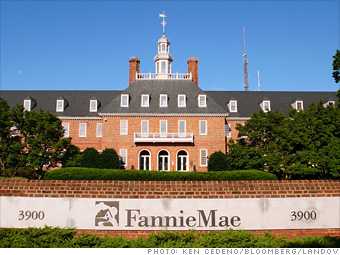
|
| Fannie Mae |
If the bank is doing poorly for some reason, the stockholders get wind of it, and the price of the stock declines as stockholders sell out. The effect of this is to bring the "capital ratio" below the required level, and the authorities will require the bank to sell more stock. That will, in turn, dilute the value of the stock of the existing shareholders, decreasing the stock value. So the effect of a sharp drop in share prices will have almost the same risk to the bank as a run on the cash by the depositors because now the shareholders will sell more stock in the hope of getting out before it declines further in value. This happened in 2008 with the stock of Fannie Mae, which dropped from about $70 a share to $10 in a few weeks, prompting the Federal Reserve to offer to loan cash reserves, and if necessary to buy the stock. After that, it sent investigators to measure the solvency of Fannie Mae.

|
| Indy Mac |
This historic episode illustrates the valuable role of the stock market in sensing trouble before regulators are aware of it, and helps explain to Congressmen who want to pass abusive legislation that "The stock market won't let you do that." A week or so earlier, Senator Charles Schumer (D, New York) had made public a letter expressing his concern about IndyMac, another large bank, with the immediate result that there was a run on that bank which made it collapse. So, not only are there banking situations which Congress does not dare meddle with -- there are even situations which the Senate Banking Committee does not dare talk about openly. Naturally, this sort of situation wounds the egos of Congressmen, but a number of left-leaning and high-handed foreign countries have in the past nationalized their banks, with disastrous results. When a bank gets to a certain size, it is as fragile as a land mine. And just as dangerous to tamper with.
Federal Reserve Changes Its Business Model
Americans generally do not begrudge the success of neighbors; the achievement of someone else takes away nothing from me. In that spirit, we like to see developing countries rise up out of poverty. A more prosperous world is a safer one.

|
| Philadelphia Federal Reserve |
Rising international prosperity can, however, disrupt matters. When developing countries become producers, they can get inflation if they suddenly have more money than they know how to spend. Sudden wealth can come from discovering oil or gold or copper; slowly learning how to manufacture something is a safer way to prosper. Inflation and huge internal income disparities often lead to revolutions, so the wiser countries sterilize local money by exporting it. Coups and dictatorships are what happens if a developing country doesn't export its inflation; sudden wealth gives the appearance of being underserved. Conversely, our recent dot-com and Sunbelt real estate bubbles show what happens to the neighbors if developing-world inflation gets dumped on them. Eventually, of course, developing countries eventually balance their new production with new consumption, and the world settles down to a new balance. Never mind denouncing the rubbish the newly-rich decide to consume; its only problem for others lies in using up the world's resources faster. Developing countries commonly export inflation to other nations in the form of commodity inflation. The neighbors can soon have a commodity bubble on their hands; when any bubble bursts, a sharp recession can quickly follow, and after that, some other kind of bubble appears. What is new and disruptive is not oil or gold or copper; it is too much money.
With luck, these disruptions consequent to a neighbor's prosperity are soon overcome by improvements in productivity. But productivity itself can create a bubble. One huge productivity windfall for America is the astonishing thirty-year extension of longevity we have experienced; in time, we will surely devise occupations for retirees more productive than thirty-year vacations. Such balancing adjustments right now seem most likely to grow out of electronic productivity, using home sites as work sites.
So in short, America must read just like everyone else and one systematic readjustment has just surfaced at the Federal Reserve. The flood of money from China and the Persian Gulf sought an outlet in our economy, adopting the device of shifting American credit sources from banks to Wall Street ("securitization"). Cheap money once derived from bank deposits in local banks; since it now often originates abroad, it now must travel through the "carry" trade and similar innovative channels for foreign surpluses to get to Wall Street investment banks, which in turn distribute the money ("credit") to American businesses which can use it more productively than the developing countries can. Through securitization (turning loans into securities), Wall Street was able to make home mortgages directly, with only token involvement of local banks. Credit markets froze up because the new procedures had neglected to enlist local bankers in the process of checking the credit-worthiness of borrowers. So long as Wall Street can continue to find new sources of cheap money, this upheaval of finance is likely to be permanent because it is desired by both sides. Access to cheaper loans and access to safer investment harmonize the needs of the haves and the have-nots. Because in its haste this new development precipitated a banking crisis, there is some danger that Congress will overreact by prohibiting securitization rather than correcting its flaws. In every participant's eyes, it's cheaper and more efficient, but new efficiency threatens old inefficiencies. This one threatens the old deposit-based banking system, and since the Fed's control of the currency is based on its control over the depository banks, it threatens the Federal Reserve. That's the real driving force behind the Fed seeking control of non-traditional credit sources; that's now where the money is.
On March 16, 2008 things came to a head with the impending collapse of Bear Stearns, a Wall Street investment bank heavily involved in Credit Derivatives. There are rumors the rescue plan implemented over a weekend had actually been devised and held ready long before then. Many imperfections now surface with experience, but at least the plan had likely been explored as thoroughly as logic without direct experience ever allows. For example, the dispersal of manufacturing around the globe favored making pieces of a product and selling them to an assembler, rather than enveloping the whole process of making a product in one giant corporation. It's cheaper, that's why they do it. But the process of buying and selling pieces to other companies greatly expanded the need for short-term credit. Therefore, it was quite unexpected that Lehman Brothers, which specialized in such short-term loans, suddenly went bankrupt for lack of quick access to capital. In the panic, it is unfortunate that Lehman apparently concealed its situation from investors. There is a danger that Congress will draw the wrong moral and somehow block the globalization of manufacture.
The Federal Reserve Act was passed by Congress in 1913, and most observers believe the Fed's inexperience in 1932 repeatedly made matters worse in that formerly greatest of all bank panics. The new plan of 2009, therefore, had to step around some limitations imposed by Congress in the past, the political pressures generated by an impending presidential election, and the powerful resistance from private industries whose future was affected. The adroitness with which such a complex matter was handled over a weekend will surely become legendary, but maybe not soon. Probably because of existing legal roadblocks, three "lending facilities" were created, but a single device was at the heart of it. Instead of lending money, the Federal Reserve offered to swap securities with new non-bank managers of retail credit. The investment banks held massive security for loans which could not be sold in paralyzed markets but could be swapped or used as security for a loan, particularly if the government stood behind the innovative transactions. Wall Street in a word had plenty of wealth, but could not turn it into money fast enough to pay its bills. So sidestepping the legal constraints, instead of giving Investment firms money as a lender of last resort, the Federal Reserve swapped Treasury Bills for the "frozen" assets held as security for mortgage loans. The securities had been "caught in a loan" as the expression goes. There isn't much difference between Treasury bills and cash, or between exchanging bonds and selling them. But the new approach could be quickly and legally accomplished, and once done, the Federal Reserve was the master of investment banks. It became effectively their lender of last resort. A great deal of advance thought must have gone into devising this readjustment to the reality that over half of loans were not backed by bank deposits, but by the securitized debt of foreigners. Regulations will ensue, hearings will be held and laws passed, but the Fed has regained control of the money supply if it can manage to make this maneuver understandable by the public.
There was a moral hazard in this; the presence of a lifeguard tempts swimmers into deeper water. It was somewhat inflationary in the midst of an inflation threat. No doubt the Federal Reserve regards these negatives as prices worth paying, and they probably are. The decisive remaining issue is not whether the initial shape of this transformation is exactly correct; it surely isn't. Just as was true in 1932, what will ultimately matter most will be whether, with this altered stance, the Fed will adjust quickly and appropriately to future difficulties. And whether politicians will even permit it to do the right thing, assuming anybody then knows what the right thing might be.
www.Philadelphia-Reflections.com/blog/1465.htm
Financial Institutions of the Future
Things which normally dominate newspaper front pages, like presidential elections and World Series baseball, are now found back among the brassiere ads -- displaced by the stock market, credit market, banking and investment crisis of 2008. However, like the wake of a ship at sea, the past could be pointing to the future. Contemplate all the mighty financial institutions which have simply vanished.
It may even be trivial to say that Lehman Brothers and Bear, Stearns have disappeared. The fact is every investment bank has disappeared.
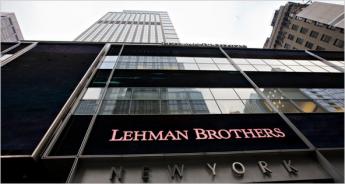
|
| Lehman Brothers |
And that's not all by a long shot. Savings and Loans have disappeared. Small commercial banks, and even most of the pretty big ones have disappeared. We may soon be left with half a dozen major banks and no lesser ones. Commission-based stock brokerage is now a rarity. Insurance? Well, the longevity increase of thirty years over the past century gave life insurance an enormous unearned windfall; when that flattens out, will such institutions still prosper? Individual corporate stocks are quickly vanishing into the homogenized soup of index funds, just as the securitized debt was digesting home mortgages before the current uproar. The ranks of stock analysts are thinning out; it no longer matters as much if they have a conflict of interest with nonexistent investment banks and stock brokers. All of this disappearance of institutions is in the recent past, and it mostly isn't coming back. Perhaps hedge funds and private equity companies will take over, but it is really too soon to say if they will survive, either.

|
| Credit Cards |
Credit cards have been overused and abused; that can be corrected. But the credit card system is supported by exorbitant fees charged to participating merchants; the card industry could easily disappear if the merchants devise a way to escape this private taxation; merchants universally wish to do so. The currency version of money is trying to disappear as fast as practical ways can be devised to measure value and transactions electronically. The remorseless pressure behind reducing all transactions to electronic form is created by the greatly reduced cost of it. And that pressure is magnified by electronically speeding up transactions; the faster money turns over, the more its virtual size increases. The converse, of course, is that a slow-down reduces its size. Like a giant tuna, the money supply dies of lack of oxygen if it slows down.
It can be seen in retrospect that banks are dying because everybody else stole their products by providing cheaper alternatives, mostly with computers. In the process, the national economy gets more uniform, less dependent on local agencies. Something of value has been lost, of course, particularly the local assessment of the capabilities and requirements of local customers; somehow, that seems to be expendable. But one thing, perhaps two, cannot be dispensed with.
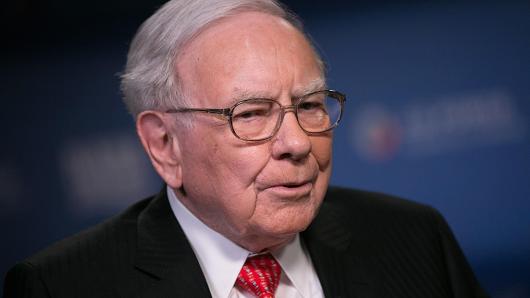
|
| Warren Buffett |
For fifty years, we have grown accustomed to the idea that the electronic records of our institutions are accurate. That's definitely not so. Even a reliable firm makes a myriad of errors in its many transactions, catches them with redundancy and cross-checks, and presents the cleaned-up product once a month or maybe even once a day. But even though the illusion of flawlessness is maintained for the customer as much as humanly possible, it is not inherently flawless. Systemic breakdowns will always expose uncorrected flaws caught in the process, while disincentives are created by this one-sided system to spend money perfecting and refining its quality control. It's better than the old manual systems, of course, but its flaws are constantly exposed by the remorseless external pressure to do things faster, in bigger volume, in greater complexity. We approach the point where every individual needs to maintain a duplicate computer system to verify his accounts. Individual telephone bills, for example, require the aid of a computer to explain what another computer produced, brokerage transactions need computerized counterparty challenge to expose hidden fees and costs. We all know how lack of transparency brought securitized mortgages to their knees. We will soon learn that the meaning of credit default swaps defies even expert comprehension. The mysteries of university tuition discounts, hospital insurance, and even supermarket discounts cry out for safeguards to generate transparency. It may be true that even billionaires like Warren Buffett do not bother to check the accuracy of all accounts presented to them, trusting the fairness of the counterparty. But that does not contradict the need for balance. Institutions of independent public accounting are surely going to make an appearance in the future, telling people what they have and what they are paying for.
The other component which seems to be missing in our transaction system is a well-developed and widely available profession of financial advisors, equipped with electronic tools to provide their badly needed services affordably and accurately. Not only do agents and advisers need some tools, but they also need the political power to force high-handed vendor systems to permit universal customer verifications; the hooks and portals to their private systems need to be developed to make this system workable, and that will not be willingly forthcoming. But they must be provided because any independent advisor/auditors need to be subject to constant reverse-confirmation if we are to escape creating a gigantic imperfect-agency problem. But it always remains that a vendor is not an agent of the customer; his ultimate duty is only to provide an arms-length transaction with transparency. It is the customer's duty to secure his own verification system. When that occurs, it will become part of the third party duty to consent to safeguards against his own imperfect agency. But that's for later. At the moment, independent auditors of the sort needed, scarcely exist.
Much can be gained by searching to correct the flaws of the past whose significance is suddenly apparent. With a stroke of genius, the 2008 reforms of the Bush administration offered a government guarantee of safety for bank accounts which pay no interest. The light finally dawned that businesses use banks for settling up accounts and are more or less indifferent to the interest paid on deposits. When there is a bank panic or a run on a bank, deposits are shifted from bank accounts to Treasury bills in order to find safety; that's now unnecessary. If a bank account pays no less interest than a Treasury bill and is just as safe, why move it? Under the traditional system, deposits seeking safety depleted the load capacity of the bank and erected a barrier to recovery from the slump that often caused the problem. Why didn't we think of this before?
One of the sources of panic in 2008 was the enormous size of credit default swaps, several times larger than the entire American stock market, many times larger than the national debt. How could we allow such a vast over-insurance to occur? But as some appreciation of a large amount of credit swapping with foreign nations began to grow, things calmed down. If that should unravel the mystery, it is certainly far easier to determine the proportion of international swapping than to set up detailed accounting reports for $60 trillion of default insurance, particularly when the record-keeping intermediaries suddenly go bankrupt.

|
| Alan Greenspan |
As soon as the calamity of mortgage-backed securities made its appearance, hands were wrung that originating banks were not required to retain a piece of the mortgage. It seems sensible to impose this requirement on the only party in the chain with the opportunity to evaluate and screen the risks, face to face. So, we can probably expect legislation with the effect of requiring originating institutions to retain "a piece of the action". The principle may need to be extended into other areas, as well. Investment banks until fairly recently were partnerships, not corporations. The capital of an investment bank was supplied from the personal resources of the partners, who usually retired at quite an early age rather than retain big risks without actively coping with the constant pressures of hands-on oversight. Investment banks found they could not raise enough capital from rich partners who were constantly tempted to cash out, so they incorporated and sold stock to the general public. The consequence was the managers were placed in the position of taking big risks with other people's money, and able to pay themselves huge salaries without the constant snooping of rich partners at the next desk. For the time being, investment banking has been totally absorbed into other institutions, but the culture shock of mixing risk takers with risk avoiders will surely lead to something else. Like originating banks with mortgages, the originators of IPOs need to acquire some personal risk of their own, because their essential innovations will always race ahead of the imagination of underpaid plodding regulators. Instead of making a game of outwitting the regulators, investment banking must place much more reliance on the examples within their midst, of rich young kids turning themselves into paupers by assuming the wrong risks.
While we are wallowing in the idea of reconfiguring world finance to avoid the mistakes of the past, some thought should be given to goals. Alan Greenspan was able to win every argument with his reputation of guiding the economy through eighteen years without a major recession. Now that we have resigned ourselves to a return of the business cycle, maybe we should ask whether it is wise to go eighteen years, or even five years, without a correction. Some of this has to do with election cycles, so it isn't easy. But perhaps we have learned that perpetual prosperity is a mirage, small frequent readjustments are better.
Making Money (8): Virtual Money
 When money was tangible you had to guard it, now that it's mostly virtual you have to verify it. Hardly anybody can, and that's a problem. 
|
When money and wealth were wampums, precious metals, and paper currency, these physical objects required physical protection. It was all a big nuisance, with six-guns on the belt, bank vaults, and appraisers of one sort or another. But now that wealth is merely a bookkeeping entry on someone's computer, things may be even more nuisance because verification is almost beyond us. Counterfeiting of the computer variety must be left to institutions to detect or deflect, causing them to introduce firewalls of various sorts that also block legitimate inspection by customers. "Trust but verify" doesn't work so well in this environment. Let's use a personal example, slightly fictionalized to protect the innocent.
Several software products now exist to download transaction information automatically from various institutional sources to a customer's home computer; they are either free or cost a nominal amount, and are quite "user-friendly". In my case, however, the reports they generated were quite significantly at variance from the monthly reports which were issued directly by my counterparties. Dear Sirs, Please explain.
What I soon discovered was that everyone blamed someone else, and everyone blamed me for bothering them. Quite obviously, I had little understanding of these specialized accounting niceties, and quite obviously I had too much spare time on my hands. Telephone help desks, often located in India, will not give out telephone numbers for incoming calls and are programmed to check the size of your account before placing you in a call-back queue. The first call is usually taken by a trainee whose job it is to screen out the silliest sort of help request, and then to refer to a supervisor if things rise in complexity. Supervisors have supervisors. That's if you are lucky. More commonly, the tedious software business has been farmed out to a vendor, and the contracting agency has neither the necessary understanding of the issue nor any ability to fix it. From the sound of it, the vendor often gives the contracting agency the same sort of isolation treatment that they would give a customer if he could find their telephone number. And guess what. At the end of the day, one of those high-handed defensive linemen -- turns out to have been at fault.
Let's explain one problem. On the surface, we were talking about a $40,000 difference in account balances; one may have been correct, but a second one must have been wrong. That rises to lawsuit level, so the matter got intensive study. It turns out the stockbroker had misinterpreted instructions for a "sweep-account" system. When a stock in your portfolio pays a dividend, the amount of the dividend is subtracted from that stock's line item and added to the line item of your money-market fund. That's fine, but there is one exception. When the money market fund itself pays a dividend, subtracting that dividend cancels out the addition, and the dividend essentially disappears from your net worth. Was this intentional? Certainly not; no one could stay in business doing that. It's not even a highly stupid error, since you can easily see yourself making the same oversight of the one implicit exception to the rule of sweep accounting. Because of this "bug" in the program involved one institution making a mistake and transmitting it to a second institution, the systematic error did not unbalance any books, until it reached mine. But since I did not detect the error for five months, there must be dozens, hundreds, maybe thousands of customers who did not detect it. Ouch. Do the math yourself to judge whether this was a serious error.
This illustration, only one of several on my personal report, leads to at least two larger principles. The first is that the transformation of money from tangible to virtual has occurred so rapidly that bullet-proof safeguards have not had time to emerge. After a century of use, most people cannot balance their checkbooks, but enough people can balance them so that systematic errors are not likely to slip past. When enough people with home computers repeatedly test the internal complexities of their virtual money accounts, confidence will develop that the system is probably working. Confidence is an important matter; it is possible to imagine quite a bank panic if the public suddenly got the idea that virtual money is maybe a mere vapor. In fact, the securitized credit panic of 2007 is a little like that. With a few new regulations and a lot of computer programming it surely will be possible to know who owns how many bum mortgages. That innovative mortgage system got ahead of its tracking verification, and we now just have to hope nothing serious happens before that gets fixed.
The second important lesson is that our health insurance system has a similar problem of far greater size and complexity. We are here talking about at least ten percent of Gross Domestic Product, in which one daily unit of measurement is in truckloads of insurance claims forms. Stocks and bonds are admittedly complicated but compared with thousands of different diagnoses, drugs, procedures, and hospitals -- verifying financial transactions is trivial compared with measuring medical ones. With a twenty billion dollar budget and ten years of lead time, we might have a shot at it. Except for the fact that during the ten-year interval, medical care will have changed so much, you will have to start over on the project.
National Debt, National Blessing

|
| Alexander Hamilton |
In 1789 while arguing for the establishment of a National Bank, Alexander Hamilton made one of the most famous counter-intuitive assertions of his controversial career. "A national debt, if it is not excessive, will be to us a national blessing".
The very suggestion of such an idea enraged Thomas Jefferson and his Calvinist adviser, Albert Gallatin. James Madison, ever the political schemer, immediately recognized a new bargaining chip in his move to relocate the national capital to Virginia. Political parties were promptly invented to mobilize votes on both sides, and the national bank remained a divisive issue for half a century afterward. Neither a borrower nor a lender is; how could anyone, then or now, say the debt was a blessing?
Indeed, that's evidently how the leaders of Singapore, Malaysia, Australia, China, and several other prosperous states still feel about it. While not eliminating taxes, these countries accumulated surpluses and created sovereign-wealth funds. Having paid off the national debt, and still finding a national surplus, what else are you going to do with it?
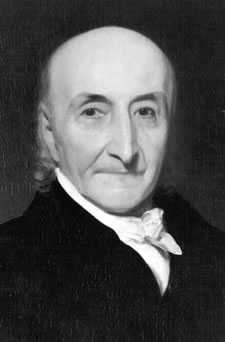
|
| Gallatin |
These countries hired investment advisers to buy stock for the funds, evidently feeling American stocks were the safest bet; it's hard to criticize that conclusion. In the present credit crunch, they are investing five and ten billion per transaction in the equity of America's premier investment banks. So far, they only acquire 5 or 10 percent ownership, but then the credit crisis may not be over yet. For them eventually to acquire 51% controlling ownership somewhere is not at all inconceivable. An ominous sign of where that might lead is found in our own captive pension funds. The state employee pension funds have quickly become captive to unions with their own agenda, with the result that the prosperity of the companies in the portfolio could be sacrificed to the benefit of interest groups. And yet, it wouldn't be so hard for America to do the same thing. If Congress had adopted the Bush proposal of three years ago to create an investment fund for Social Security, we ourselves would soon have what amounts to the largest sovereign wealth fund in the world. Could this be a solution to the weakness of the Federal Reserve in controlling the currency with bank debt? Could we somehow create a common world currency based on a common fund of sovereign wealth funds and with that, create a new definition of wealth based on equity rather than debt? The technical answer to the potential corruption issue would probably lie in stripping the voting power from such shares and then submerging them in a world index fund. The United Nations sound of it nevertheless still boggles the mind. Are people who oppose an equity-based world currency going to be forced like Gallatin to eat their own dusty words when the reality of debt-based currency sinks in? How many of the ambassadors of ideas about such suggestions, both pro, and con, would eventually surface as sneaky connivers like Madison, with a hidden side-agenda? After all, in a democracy, everyone is expected to marshal every argument, weak or strong, for his own self-interest.

|
| Federal Reserve |
The loss of banks as a tool for the Federal Reserve would undermine the way the Fed does its job. A deeper reality is that many governments really don't want the job to be done perfectly and independently. The European common currency, the Euro, is already irking the French and other national governments who sometimes hanker to inflate away their debts or deflate their way out of the subsequent inflation. A perfectly automatic currency regulation threatens an important ingredient of the sovereignty of nations, thus the whole concept of nationhood. Somehow, the desire of markets to enhance wealth must come to terms with the desire of governments to re-elect themselves.
It will take more than the present crisis to provide credibility for ideas as wild as substituting equity-based currency for the present debt-based one. Unless someone devises a better-sounding scheme, it seems more likely that financial Jacobins will propose sacrificing the unwelcome intruder. Derivatives, whatever that means, started this mess. Maybe we should make them illegal.
Proposal: A Second Federal Reserve

|
| The Global Interdependence Center (GIC) |
The Global Interdependence Center (GIC) holds an annual monetary conference of considerable eminence, and this year it was held on the grounds of Drexel University. A featured speaker was Henry Kaufman, who has long been the voice of Salomon Brothers, a New York investment bank. Since one of the main activities of that firm has long been bond trading, what Mr. Kaufman has to say about the current credit situation is of considerable interest. Wasting no time with preliminaries, he dove right into the topic, which is characteristic of speakers with too little time to say what's on their mind.
Securitization has, in his opinion, been excessive. Computers have provided increased interconnectivity, increased speed, and consequently lack of transparency in the credit markets. Consequently, senior managers and directors lost track of events and therefore failed to restrain risk-taking. Especially, SIVs (hidden subsidiary corporations) increased risk without restraint. Excessive management compensation has had the effect of relaxing management control, and there has been too much credit floating around. The capital was chasing investment instead of the other way around. But in addition, the architecture of the system is at fault, and the problems just happened to hit subprime mortgages first. Short term money was supporting long-term obligations, which can be described as a conflict between the amount of risk and the duration it was at risk. No one who actually needs a bail-out should be allowed to have one.
 No one who actually needs a bailout should be allowed to have one. 
|
| Henry Kaufman |
That's all pretty succinct, and likely contains a lot of wisdom. But it was a quick preamble, after which the highly practiced speaker slowed down for the real point. The Federal Reserve, charged with maintaining stability, was timid and sluggish in recognizing the magnitude of the situation. There was the main focus on restraining inflation and increasing Fed transparency while neglecting regulation. He didn't say so directly, but one gathers he approves of regulation, disapproves of transparency, and is somewhat dovish about inflation. In other words, he is joining if he did not initiate, a gathering political chorus demanding more government regulation and less reliance on the market place to structure the economy.
So it comes down to this. Since the Federal Reserve is too preoccupied regulating small banks, it has been outmaneuvered by the big ones. What's needed is to form a new regulatory agency in charge of big banks and investment banks, with big-picture management of the institutions that really matter. He didn't make any suggestions about who should be the first chairman.
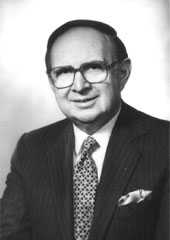
|
| Henry Kaufman |
The rest of the audience will probably be long dead after Henry Kaufman's image continues to shine, but nevertheless, there are some awkward features to this analysis and proposal. It fails to put enough emphasis on the blistering speed with which new schemes have been devised which really do benefit mankind even though the driving motive behind them may have been the purest sort of greed. The efficiency of the financial industry has been enhanced in a thousand ways, causing the cost of transactions to drop appreciably. The increased velocity, while it may have been motivated by a desire to cash in before others compete for it, is well known to increase the effective amount of money in circulation. The market finds itself with the tuna problem: to slow down is to die. One can even suspect that the excessive management compensation does not identify the buccaneer, it often represents the bribes engineered by young geniuses and intended to be offered to the older has-beens to get out of the road. Surely, the managers who have come up through the ranks are in a better position to ask questions and impose prudent restraints, than a new cadre of Washington bureaucrats who only hear of a gimmick after it has been run off the road.
It's easier to see what's the matter with this proposal than to identify what is better. The young cowboys at the computer screens of Wall Street are already better paid than the highest level of Washington, and their future aspirations are to become zillionaires in just a few more months. Someone fresh from these combat zones indeed knows what's going on, but he isn't going to give it up to become a regulator. So, Washington will instead recruit their brightest most idealistic classmates from the same Ivy League colleges, and train them in the most esoteric economic theory, They will be brilliant and attractive, idealistic and energetic, But they won't learn what's going on until that thing no longer matters and a new unsuspected one has taken its place. The only people who have a chance of controlling this zoo have been bribed to keep out of the way by astonishing compensation packages. If it's reform and regulation we need, here is the place to begin. Let's wait a bit to see what this thumping crash will do to get their attention.
Brave New World
Let me put some emphasis on what I consider the most revolutionary change of a current lifetime. Nothing to do with Hitler, Stalin or Mao; or jet planes, television, and computers. Or even the rise of the impoverished underdeveloped world. To me, the most revolutionary change of the past century has been the extension of the average life span, by thirty or forty extra years, depending on where you happen to live. I'm proud to be a member of the profession at the center of it.
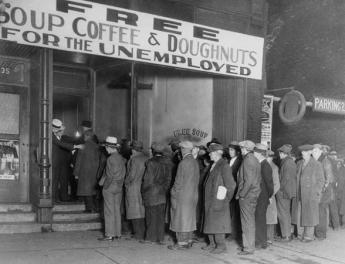
|
| The Great Depression |
Right in the middle of this revolution, the Great Depression of the Thirties convinced a great many people there were not enough jobs to go around. The Union movement, as we say, or the Socialist movement as they come right out and call it in Europe, adopted a general thesis that a limited number of jobs should be shared equally so everyone could have a chance at them. Child labor should be condemned, and those occupying "decent" jobs should retire early. A number of lesser agitations of the Thirties have the same sound to them: piecework was a bad thing because it encouraged women to work at home, depressing prevailing wages. Home offices are condemned by the IRS for similar reasons. Automation and efficiency generally were resisted. Since I persist in the notion that efficiency is almost always a very good thing, these anti-efficiency campaigns sound like more hidden agendas to spread the supposedly limited amount of available work. But all of this is a left-over idea from the great 19th Century migration from the farm to the industrial city, where job creation generally requires a manager, some risk capital, and an atmosphere of creative destruction -- all of which can seem threatening, except for the seemingly obvious evidence of their usefulness. If you have grown up hating managers and investors, it's painful to be told your only alternative is to spend a lifetime working as their subordinates.
While some people understandably oppose the forward march of efficiency, few want to live shorter lives. Even victims of self-inflicted conditions generally drawback when the consequences become fully visible. Mistaking a lifetime of paychecks for a lifetime of work, they wish to extend one without extending the other. That's called inflation, it seldom creates wealth, usually destroys it. It's vaguely possible that alcoholism, unsafe sex, and recreational drug consumption are efforts to end it all, but let's be charitable. More likely those confused souls are just that, confused.
And that's where matters seemed to rest until recently. People didn't specifically ask for this extra longevity, and while often willing to risk it, are seldom willing to lose it. My own elderly generation can start to see signs that a protracted retirement can eventually lead to running out of money, so there is plenty of need for an open mind, experimentation, and innovation about making retirement a more productive period of life.
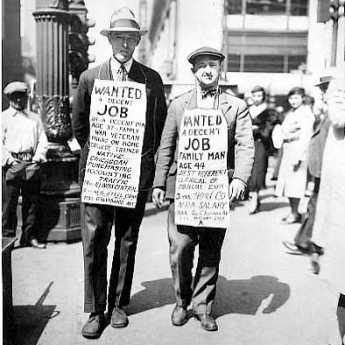
|
| Great Depression of the Thirties |
I heard some college kids talking; kids do talk a lot. The proposition argued was essential as follows: Instead of adding a few years to your retirement, when you are feeble and useless, why not deliberately offer kids an extended period of loafing, when health is good, love-making is vigorous, and the ability to endure the debilitating effects of recreation is still strong? A grungy lifestyle is more tolerable for someone who is thirty than for the same person at seventy-seven so it could be an overall cheaper lifetime. An additional five years of pizza for breakfast; sounds heavenly.
Boys and girls react to this proposal in biologically different ways, of course. Boys don't have the same biological clock, telling them they better start their families while they still can. Raising little children is strenuous, particularly during time shared with continuing education, starting a career, or finding a husband. Getting a divorce is also a surprisingly debilitating distraction, seldom recommended by those who have experienced it. The males have an easier time loafing; so why not return to the customs of a century ago, when girls planned to get married during the same summer they graduated from college. Because a big part of that tradition was "Don't get married until your ship comes in," it tended to define an eligible male as someone thirty years old. Unfortunately, that interferes with another new trend, the buddy system.
Most girls now expect to go to college, and colleges have mostly become coeducational to accommodate the expanded market. Hand in hand kids stroll the lawns of academe, more like siblings than lovers. The faculty marvels at this phenomenon, which to them seems like an unfamiliar mixture of incest and promiscuity, but it does not quite follow the rules of either entertainment. Since the buddy system is probably connected to the increasing divorce rate, universally condemned as a bad thing, it may further evolve into something else. It's been suggested men should get over their traditional reluctance to raise someone else's children. Now that's an idea which is going to take some time getting used to.
So, all in all, let's swallow our generational pride and seriously consider whether we just ought to do what our grandparents did. Men should wait until thirty to get married, while women should marry at twenty; simple. It forces feminists to admit that in one sense they are inferior to men, so declare victory and ascribe it to an innate superiority of women. It also calls the pseudo-sibling pairings of school children into question, which is essentially the only thing new in this whole business. It's probably a lot of fun, but it exacts too high a social price.
Steep Yield Curve: A Useful Subsidy?
The steepness of the federal interest rate curve -- ten-year treasury bonds pay more interest than three-month treasury bills, and the rate for intermediate time intervals slopes gradually from one to the other -- is a function of the Federal Reserve; the slope of this curve concisely describes current Fed policy. The Federal Reserve controls the money supply by raising or lowering short-term rates, which "affects the slope at the short end", and mainly in this way restrains or encourages inflation, or alters the exchange value of American currency. For the most part, long term rates are set by the public bond market. Once in a while, the Federal Reserve does buy or sell long-term treasury bonds to modify long-term rates in the economy. By affecting rates at either end, the result is some kind of change in the slope of the curve.
Because banks make interest payments to depositors near the short-term federal rate, while the same banks charge borrowers at near the public long-term rate, the current slope is the main determinant of bank profits. Banks borrow short and lend long. If Federal Reserve tinkering steepens the curve more than it would be without interference, then bank profits are subsidized. Of course, it works the other way as well; in a banking crisis, yield curves can be steepened to rescue banks from failure, thus potentially sacrificing ideal monetary levels temporarily. For the most part, what is good for the banks is good for the economy; but it remains that bank profits are subsidized much of the time. Artificially widened yield curves either punish savers by lowering interest rates on their savings accounts or else punish borrowers by increasing interest rates on mortgages and other credit. For political reasons, the pain is usually shared among voting blocs. It can be argued this invisible subsidy of banks by the public creates a compensating benefit of economic stability despite occasional bubbles and recessions like the present one. However, the Federal Reserve system has been in operation for almost a century, revealing a long-term bias in favor of inflation, which is a subsidy of debtors by creditors. Present policy deliberately targets a steady rate of 2-3% inflation; the gold market responded to a century of this by raising the price of gold from $17 to $900 an ounce. A 1913 penny has become a dollar (before taxes) you might say. You might also say it took the Federal Reserve less than a century to make the present dollar worth a penny.
If gradual inflation is a consequence, a fair question must arise whether the Federal Reserve is worth its cost. Compared with an inflexible, relentlessly deflationary Gold Standard, yes, it is. Even accepting the monetary crisis as partly created by central banking, the international dominance of the American economy and recent smoothing of banking instability testify to the durable use of the Fed. But another criticism must be faced: In subsidizing depository banks with an artificial yield curve, is the Fed backing the wrong horse for the future? To answer that question, examine two components: With computer technology rapidly advancing, can the Federal Reserve accommodate non-banking competitors to banks? And secondly, international central banking appropriately accommodate globalization? There are, after all, aspects within the 2007-20?? a crisis which suggests -- maybe it can't.
Steady inflation of 1000% per century may well be preferable to 19th Century volatility of 1000% every ten or so years. But a gradual rise of, say, 500% or less each century might be even better. Relentless political pressure on the Federal Reserve has typically been used to explain its slow retreat from truly stable prices, and this defense takes the form of mentioning its dual mission of minimizing unemployment while holding prices as steady as possible. In recent years, European political rhetoric goes further, aspiring to add the right to employment to their fifty-page Bill of Rights; similar utopianism has crept into our own news media. Governments for thousands of years have cheapened their currencies. But while the drift is clear, our own pace is set by the amount of subsidy required to maintain a steep yield curve. As retail banks have struggled to compete with the wholesale investment banks, their increasingly uncompetitive costs require a greater subsidy from the yield curve. It is always going to be more expensive to aggregate deposits for lending purposes than to raise large sums by floating a bond issue. Securitization is here to stay because retail banks have consolidated and savings banks have gone out of business by the thousands; the mortgage industry can no longer survive without substantial amounts of mortgage-backed securities. Nor should it; securitization is a sensible route for importing capital from nations with a trade surplus. Depository banks long ago lost the borrowing business of corporations large enough to float their own bonds; securitization provides a means for smaller borrowers to share the same efficiency. After it has tried everything else, Congress will eventually devise a reasonable regulatory system for derivatives. Except for smoothing the transition to whatever proportion of market share the investment banks can justify, perhaps all of it, the subsidized yield curve impairs efficiency. It would be a mistake to allow some foreign nation to exploit such an opening before we do. The technical problem for all central banks is to devise a suitable alternative method of controlling the currency, other than by targeting inflation with adjustments in interbank lending rates.
Observers led by Martin Wolfe the economist for the Financial Times feel the 2007-20?? financial crisis can be adequately explained by Chinese pegging their currency too low, and could be rectified by persuading the Chinese to float their currency. Regardless of this extreme view, globalization is clearly both a good thing and an inevitable one. Thus some form of discipline must be devised to prevent central banks from destabilizing it for their own advantage. Wolfe proposes the use of a strengthened International Monetary Fund, which is unfortunately apt to project international politics into a process which could be harmed by it. An alternative to be examined might be to pool sovereign wealth funds as a pooled currency reserve, although this system probably could not withstand present extremes between surplus and debtor nations, so getting world acceptance could be protracted. Ultimately, everyone realizes that the real backing for an international finance system is the net worth of the whole world. But the example of Lloyd's of London is a haunting one; no one relishes putting absolutely everything at risk, down to the last shoe button. In the event of a disaster, everyone wishes to hold back some nest egg to use for recovery. Because of the same line of thinking, almost no one would trust foreigners to control more than a limited share of their future.
The future of international monetary relations is thus quite murky, but current pressures would seem to be driving something fundamental to change. When it does, regulating artificially manipulated yield curves had better be kept in mind.
How The Markets Really Work
Poor Richard's Wealth
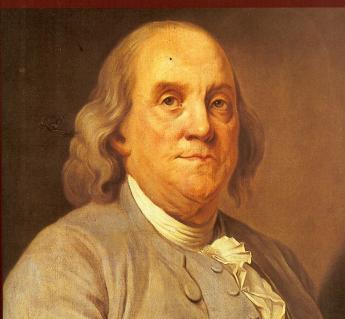
|
| Benjamin Franklin |
I RISE to offer yet another toast to Benjamin Franklin. Like our two leading candidates for the Presidency of the United States, he leaves us uncertain whether he was a rich man pretending to be poor, or a poor man pretending to be rich. To clarify this mystery, I have mainly examined the circumstances of his retirement, and the contents of his last will and testament.
Although he reports that on arrival in Philadelphia at the age of seventeen, he spent his last pennies on a loaf of bread, he was able to retire from the printing business at the age of forty-two, planning to spend the rest of his life as a gentleman at ease. He was able to do so because he had assembled over fifty partners in the printing trade, scattered from Boston to Georgia; today, we would say he had sold franchises to his business. When he came to retire, he arranged to be paid off in eighteen installments, which ought to have lasted him to the age of sixty. That was well past the usual life expectancy at the time, but we can now see it would apparently have run out while he was still in London, acting as our ambassador to Parliament, leaving him without support for the last twenty-four years of his life. Apparently, this was the reason for his seeking postmasterships and acting in some overseas business capacity for Robert Morris, then one of the richest merchants in America.
Assuming he may have run out of money when he was sixty, we look to his final estate to see how he made out in his second career, whatever it was. His assets were in three general categories: land, bonds, and hard money. He bequeathed eleven houses, mostly in Philadelphia, to various relatives. He assigned the ownership in thousands of acres of land in Nova Scotia, Georgia, and Ohio. Just what a bond was in Eighteenth-century America is not exactly clear, but bonds of at least ten thousand pounds sterling were distributed, as well as ten thousand pounds of hard assets. And he forgave a large and undefined number of unpaid debts.
He gave George Washington his gold-handled cane, which had been given to him by Duchess Du Pont, for unknown reasons. His modesty was famous but can be questioned when he gave one of his portraits to be hung in the Council Room of the government of Pennsylvania. He gave his sister a portrait of a French King, with four hundred and eight diamonds set in its frame. He instructed her not to make the diamonds into jewelry because that would be ostentatious. And he instructed that his funeral be plain and simple, although it turned out to be one of the most elaborate parades and ceremonies of the age.
After a few months, Franklin reconsidered his will and wrote a famous codicil. Revoking the gifts to his grandchildren, he ordered that a thousand pounds be set aside for each of the cities of Boston and Philadelphia. His proposal was that this money is loaned to graduating apprentices in order to help them start their businesses, and after a hundred years he envisioned it would amount to hundreds of thousands of pounds; after two hundred years, it would be worth millions and could be used for public improvements. These funds were indeed established and the loaning did begin. Unfortunately after hardly fifty years had elapsed, so many apprentices had failed to repay their loans the experiment was discontinued. What had seemingly been lacking was sufficient will of the trustees to collect the loans with vigor.
Poor Richard may have been born poor at more than one time. But he certainly didn't stay poor, very long. A toast to Ben Franklin, on his birthday, in his club.
Two Friends Create the Articles of Confederation
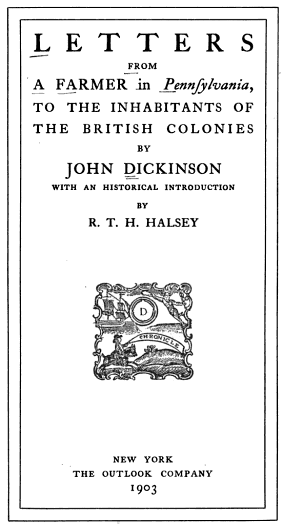
|
JOHN Dickinson had been highly critical of England's treatment of its colonies. As early as 1768 he had written a book called Letters of a Pennsylvania Farmer which is credited with strongly influencing the colonies in the direction of resistance to the British Ministry. When it came time to write the Articles of Confederation, Dickinson was the lawyer selected for the task. His good friend Robert Morris had been less outspoken in opposition to the Ministry's behavior, quite possibly because he was adept at finding workarounds for his own personal business problems. But possibly he was merely maintaining an ambiguous negotiating posture, since in a hotly contested election with this as the main issue, Morris was elected by both sides in the argument. When July 4, 1776, forced the issue both Dickinson and Morris had refused to sign the Declaration, but within a few months both of them were actively fighting for the Rebellion. The truest test of their evolving attitudes might have emerged when Lord North sent the Earl of Carlisle as an emissary after Burgoyne's defeat at Saratoga, offering peace with a sort of commonwealth status for the colonies. Not much is written about this curious episode, leaving it unclear whether the British were serious, and even if they were, whether the Americans understood the offer as serious. On the surface, the British offer conceded taxation with representation as the rebellion had been demanding. But it was rejected by Gouverneur Morris acting for -- who remains unclear. It seems possible the British were exploring the true feelings of people like Dickinson and Robert Morris but were disappointed. The earlier treatment of Ireland after it had agreed to a similar half-hearted autonomy did leave British sincerity in legitimate doubt.
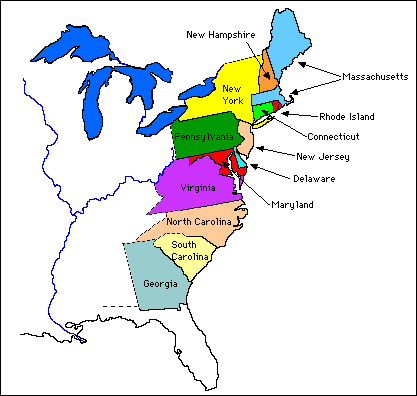
|
| Thirteen |
The thirteen colonies had united to fight the British King, but many of them were reluctant to unite for any other time or purpose. Rhode Island was perhaps the extreme example of this view of what Independence was supposed to mean, but the feeling existed to some degree in many colonies. Concern for the power of this feeling of tentativeness may have contributed an important reason the Articles placed heavy emphasis on declaring the document to represent a perpetual arrangement. Recognition of the weakness of this intent may have been an important reason why George Washington was later willing to sweep the issue aside, even though he of all people was most concerned to avoid the appearance of acting as an arbitrary king. For these and other reasons mainly revolving around state boundary disputes, the Articles remained unratified for years. Finally, in 1781 Robert Morris became convinced that failure to ratify was encouraging the states not to cooperate, and successfully pushed ratification through its steps. At that time, Morris was effectively running the country, even providing his own credit and funds to do it. People were reluctant to oppose his wishes, but they were also unwilling to provide the taxes, supplies, and troops that Morris imagined were being blocked by failure to ratify. Ratification of the Articles accomplished very little except to convince Morris: the Articles were flawed and must be replaced with something conferring more central power.
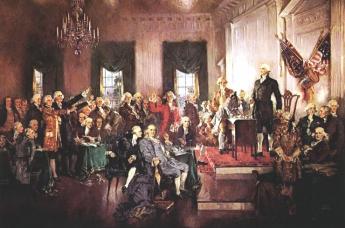
|
| The Goal: 1787 |
Little is known about the evolution of Constitutional thought in Morris' mind between 1781 and the Constitutional Convention in 1787, although a great deal is known about his other numerous activities. It is clear, however, that his experience with the recalcitrant Pennsylvania Legislature had been dismal, while he came to see the one insurmountable flaw in the current Federal government was its inability to levy taxes and consequently, to service national debt. The states were able to levy taxes under the Articles but erratic in doing so, resorting to paper money inflation at the first sign of tax resistance. In Morris' view, the key to the effective government was to reverse the situation; let the national government tax, let the states spend. The key to such rearrangement would be to permit the national government to spend on a very limited list of vital purposes, but bedazzle the states with a substantially unlimited shopping list if they thought they could afford it. As the accounts to pay for the Revolutionary War totaled up, it was apparent that the National Government had twice as much debt as the states. Therefore it would at most, need twice the state taxing power to service such a debt; presumably, wars would be infrequent and it would be less than that. Pay this one off, and potentially the need for future federal spending would be small. Indeed, under the presidency of James Monroe, the national debt was completely paid off, although briefly. It was almost as if Robert Morris and his pupil Alexander Hamilton had a crystal ball.
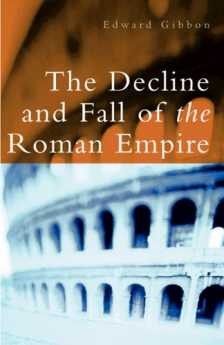
|
| Decline and Fall, Anyone? |
Robert Morris was brilliant and had six years to fashion his strategy, but he also had some help. For one thing, George Washington lived next door much of that time. By then, almost no one dared confront Washington. Adam Smith had written his book The Wealth of Nations in 1776, and Morris gave this extraordinary work as presents to his friends. Morris had corresponded with Necker, the genius financier of France, and through his good friend Benjamin Franklin, gathered insights from the rather advanced British national finance. And James Madison brought in scholarship about politics and statecraft accumulated by Witherspoon, Hume and the Scottish enlightenment. The year 1776 was a remarkable moment for new ideas. In that year, Edward Gibbon also published the first volume of The History of the Decline and Fall of the Roman Empire. The warning behind that important book had an important impact on the minds of important thinkers of the era, too.
Once you grasped all the central ideas, in this environment the resulting strategy almost worked itself out.
What Is the Purpose of a National Constitution?

|
| 13th Century Magna Carta |
NATIONAL constitutions are mainly an outgrowth of the 18th Century Enlightenment, even though similar features are to be found among ancient legal codes. Those who trace the origins of the American constitution to the 13th Century Magna Carta will usually point to a central sentence of clause 39:
No free man shall be arrested, or imprisoned, or deprived of his property, or outlawed, or exiled, or in any way destroyed, nor shall we go against him or send against him, unless by legal judgement of his peers, or by the law of the land.
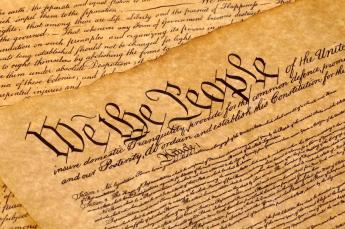
|
| American Constitution |
That's a pretty good beginning, a good example of a needed legal principle, but unrecognizable as what we would today call a Constitution. It states what a government may not do, but does not define the nature of a government which does the job best. Nor do even the many Enlightenment philosophers of government take that final step of outlining where their notions should take us until the American Constitution had been written and defended in the Federalist papers. Nowhere among the writings of Montesquieu (The Spirit of the Laws, 1748), Catherine the Great (Nakaz, Instructions to the All-Russian Legislative Commission, 1767), Diderot (Observations About Nakaz, 1774), James Madison (1787), John Dickinson(1763) or Gouverneur Morris(1787) can there be found much tightly described definition of a constitution. Certainly, there is no definition within the writings of Adam Smith if we look for rule-making among Enlightenment thinkers whose ideas were influential on the 1787 Philadelphia document. The American constitution was the product of many minds, before and after 1787. The outlines of its final form converged, and emerged, from the Constitutional Convention of the summer of 1787, with Gouverneur Morris as the penman of record. To him, we certainly owe its succinctness, which is the main source of affection for the document. That probably understates matters; in his diary of the secret meetings, James Madison records that Gouverneur Morris rose to speak about 170 times, more than any other delegate. Lots of thought and debate; ultimately, few words.
The Elizabethan Sir Francis Bacon has the greatest claim on devising a theory of law and law-making in the Anglosphere tradition. But his elegant modification of Galileo's scientific method, the English Common Law, is more a methodology for creating good laws than an outline of a nation's legal principles. Anyway, tracing the American Constitution back to an underlying British one tends to stumble when the British Constitution fails to meet a definition which would include our own. The British Constitution is said to be "unwritten" to the degree it is a consensus of revered documents. It can be amended by Parliament at will, has a variable history of defining just who is covered by it, and in order to define constitutional principles seems to rely on sentences extracted from difficult context. If the two constitutions had been written and compared at the same time, one would say the British had sacrificed coherence out of respect for tradition. In fairness, some features of the American constitution are also perhaps unnecessary for every constitution, but by surviving as the oldest constitution of the modern form, have become its model. That would be:
A set of principles governing the legitimacy of a nation's laws, and firmly standing above them. It defines its own domain, geographically and by the membership of a defined citizenry. Except as otherwise defined, it supersedes all other governance within its domain. It defines and defends its own origins. It includes a description of how to amend it, which is intentionally infrequent and difficult. It goes on to outline the structure of the laws it regulates, with subtle modifications made to channel the type of power structure which will govern.
In the American case, history and culture generated several other instabilities so central they justified heightening the difficulty to amend them to a Constitutional level, thus conferring undisputed dominance over competing principles of governance. That would be:
A separation of government powers weakened all potentially offending branches of government, and thus enhanced citizen liberty. Separation of church from state, for like purpose. A right of citizens to bear arms, to strengthen citizens' defense against internal or external attack, and perhaps also warning that revolt must be possible, even endorsed, as some final extremity of protection for citizen sovereignty.

|
| Russia's Catherine the Great |
It enhances our comprehension to contrast the outcomes of competing 18th Century implementations of the Constitution idea. Russia's Catherine the Great proposed a constitution steeped in the traditions of the Enlightenment but ultimately designed to define and strengthen the role of the monarch. Denis Diderot her French protege recoiled at this viewpoint, substituting other views resembling those of Jean Jacob Rousseau. He opened Observations About Nakaz his commentary to the Queen, with the following declaration:
There is no true sovereign except the nation; there can be no true legislator except the people. Whether looking back to the English Civil War or forward to future disputes between the Executive and Legislative branches, it makes clear the Legislative branch was dominant, with the Executive branch acting as its agent.

|
| Denis Diderot |
With this ringing warcry, the French model nevertheless ushered in the extremes of the Terror, the Guillotine, and the Napoleonic conquests. The consequences of the French constitution undermined world confidence in the benevolence of public opinion, at least deeply confounding those for whom the democratic rule was not totally discredited. Once more new life was breathed into allegiance for the monarchy, military rule, and dictatorship. Public opinion, it seemed, was not either invariably benign or comfortably far-seeing. The noble savage, mankind naked of tainted civilization, was not necessarily wise or worthy of trust. Edward Gibbons, the 1776 author of The Decline and Fall of the Roman Empire was pointing out where it all might lead if we completely believed in the collective goodness of the human condition. At the least, the failure of the French Revolution complimented the viewpoint of the Scottish philosopher, Adam Smith, who also in 1776 emphatically urged a switch in that reliance toward a sense of enlightened self-interest, as follows:
It is not from the benevolence of the butcher, the brewer, or the baker, that we can expect our dinner but from their regard to their own interest.
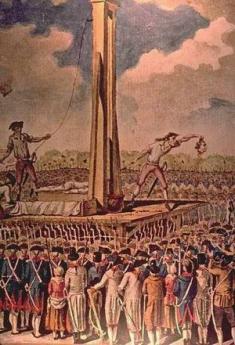
|
| Terror, the Guillotine, |
It is not surprising that Diderot rejected the Leibniz view of things that "All is for the best, in this best of all possible worlds." And, in view of his dependence on Catherine, not surprising he did not publish his rejection of it until 1823. Thomas Jefferson was in France as ambassador during the time of the American Constitutional Convention, fearing to confront George Washington; and likewise keeping his conflicting views private for several years. Eventually, they surfaced in the creation of an anti-Federalist political party along with the conflicts which kept the new nation in a turmoil for the following forty years. It is surely a testimony to the strength of the Constitution's design that the country was able to shift between such extreme governing philosophies but still hold together without changing the governing statement of purpose. Indeed, it is plausible to contend that our two political parties still continuously debate the useful tension between these two differing opinions.
National Debt, Presidential Hat Tricks, Shale Gas and Argentina
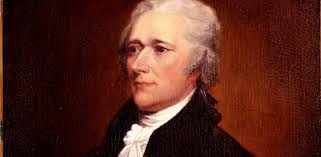
|
| Alexander Hamilton |
This-here speaker at the Right Angle Club began a discussion of the "Fiscal Cliff" razzle-dazzle of 2012, by changing his mind about the causes of the financial crash of 2007. Originally, it seemed as though globalizing 500 million Chinese out of poverty had destabilized the exuberant American mortgage market by flooding it with cheap credit. Supplanting that idea, or perhaps only supplementing it, must now be added the overextension of national debt itself to a point of bringing national borrowing to a halt.
Early in the Eighteenth century the Dutch and English had monetized national assets through a system of national borrowing formalized by Necker in Europe, and Robert Morris and Alexander Hamilton in America. Aside from a handful, no one could understand what they were talking about. Try reading that sentence a second time.
It amounted to guaranteeing all the private credit in the banking, investment, and commerce systems, with a national debt (in the form of Treasury bonds) which monetized all the assets of the whole nation. That action more or less doubled their value, just as any bank loan is seemingly owned by two people at the same time. Carried to an extreme, it might imply that America could turn Guam and Hawaii over to China if we defaulted on our debt. That was never actually intended to happen, and it never has, because all nations now fear the deflation which could result from triggering a massive exchange of national assets. The nebulous issue of "National Sovereignty" interferes with territorial transfers by any means other than war. If one nation defaults against a second nation which is afraid to go to war, it is just the stronger nation's hard luck about the debts it has chosen to support unless a transfer of assets actually happens. The Treaty of Versailles did transfer assets to the victors, and set off World War II, although it is considered bad manners to mention it. That's a simplified view of our international financial system, which admittedly skirts uncertainty about how much national debt is too much.
In fact, no one knows how much is too much until everyone runs for the exits. Now that politicians have control of computers and "big data", a modern description places the blame on Alan Greenspan the former Chairman of the Federal Reserve. For eighteen years Greenspan produced delicious world prosperity by steadily increasing American national debt faster than the American economy was growing. Sooner or later this approach was going to uncover how much was currently too much Federal debt. With silver and gold removed from the equation, one could see that default would certainly loom whenever the size of the debt became so large it could never be serviced by the Gross Domestic Product (GDP), and possibly sooner than that, if enough people could guess what was coming. This reality might be obscured temporarily by reducing interest rates, modifying international trade balances, and inflation. When the stars were in alignment however, the system just had to collapse and start over. Because it happened gradually, perhaps it would unwind gradually. In 2007 what happened was that everybody tried to get out the door at the same time. Essentially, our two political parties made opposite assessments: the party of Hamilton -- Republicans -- announced this system was doomed, while Democrats --the party of Andrew Jackson -- announced they could stave off disaster by making the rich Republicans pay for it. Both parties were partly right but essentially wrong, and the Democrats hired a better magician.
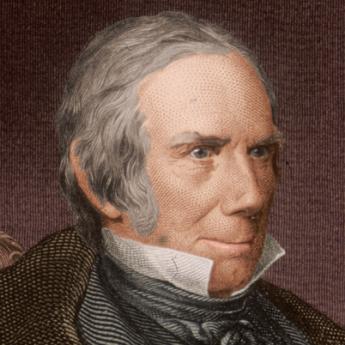
|
| Henry Clay |
It will take months or even years to be certain just what strategy was pursued. It would appear the Democrats chose to repeat the performance of the Obamacare legislation, eliminating national debate by eliminating the Congressional committee system of examining details in advance of a vote. Given one day to digest two thousand pages prepared by the Executive branch, no time was allowed for public opinion to form about Obamacare. In the case of the fiscal cliff episode, Congress was given less than one day to consider 150 pages allegedly prepared the day prior to the vote. Some will admire the skill of the executive branch in orchestrating this secret maneuver, but eventually, it must become apparent that policy decisions have been transferred from the legislative to the executive branch of government. Perhaps the Congressional Republicans are as stupid as the Democrats portray them to be, but it is also possible that a decision has been made to tempt the Democratic leaders into repeating this performance several times until eventually, the public is ready to consider impeachment for it. No matter what the strategy, we are now threatened with imagining some moment when gun barrels come level and live rounds slide home. We may pass up the opportunity to criticize Henry Clay for concentrating undue power in the Speaker of the House, or to uncover the way Harry Reid was persuaded to surrender Senate power to the Executive; both miscalculations are fast becoming irrelevant in the flurry of events. We came close to borrowing too much, exceeding our means to pay it back, that's all. A New York Times editorial economist feels we can "grow" our way out of this flirtation with danger, and we all certainly hope so.
Seemingly, there are only two ways to cope with over-borrowing, once we step over the invisible line. A nation may cheat its citizens with inflation, or it may cheat foreign citizens by defaulting on their currency. We are indebted to Rogoff and Reinhart for pointing out there is no difference between inflation and default except the identity of the cheated creditor; so most politicians prefer to cheat foreigners. Either way, cheating makes deadly enemies. Two centuries ago, Alexander Hamilton suggested a third way out of the problem, which we would today call "growth". But here, cheating is pretty easy: If the limit is some ratio of debt to GDP, find a way to increase nominal GDP.
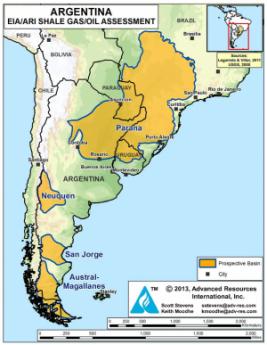
|
| Shale Gas and Argentina |
The most astonishing current example of the power of "growth", is shale gas. It may not be totally clean, but it is cleaner than oil or coal, and far cheaper. We suddenly have so much of it the price of energy is artificially lowered, and we talk, not merely of energy independence, but of restoring the balance of international payments by exporting it. Germany is constructing steel mills to utilize iron ingots made in America with gas instead of coal. Pittsburgh was once the center of steel production because that's where the coal was, the most expensive ingredient to transport. Suddenly it is now apparently cheaper to transport the energy source to wherever you find limestone and iron ore. JP Morgan got rich the other way, transporting limestone and iron ore to Pittsburgh, where the coal was. Russia now finds it has lost its leverage over Eastern Europe's energy supply, and the Arabs (?Iranians?) will no longer have a monopoly to provide the wealth supporting Middle-Eastern mischief. China may lose interest in Africa. And in America we may develop the courage to rid ourselves of the corn subsidies for gasoline; cutting the wind and sunlight fumbles also emerge as obvious ways to cut the deficit. That's what we mean by growth. It's so powerful it makes action by any American President seem trivial by comparison.
Presumably, President Obama does not welcome being upstaged by an economic force he doggedly resisted. He may seek ways to imply it was his idea all along. When that happens, rest assured that everyone else is then a fracker. But there is another alternative Presidential path, which in extreme form is emerging in Argentina without much media attention. In short, Argentina discovered signs of oil deposits but was unable to exploit them. A European oil company was enticed to develop the oil reserves at its own expense, and effectively did so in expectation of reward from the resulting oil sales. Suddenly, the Kirchner government expropriated the oil company, paying for it with Argentine bonds. The ink was scarcely dry before the Argentine government abruptly turned around and offered to buy back the bonds for 24 cents on the dollar. And unless someone is willing to send gunboats, the previous owners of the oil company are just out of luck. Appeals to the UN are futile; because on the one-nation, one-vote principle, there are more expropriator votes in the UN than potential victims. The only thing visible which could save capitalism in South America from the revolution in shale gas competition. Presumably, Argentina has lots of shale gas, but who will lend them the money to frack it?
Implicit Powers of the Federal Government
<The two highest achievements of James Madison, had been and still remain, the writing of the Bill of Rights, and acting as a close collaborator with George Washington in fleshing out the role of the President in the new government. The Ninth and Tenth Amendments made it clear that the federal government was to be constrained to a limited and enumerated set of powers, while all other activities belonged to the states. This was already clear enough in the main text of the Constitution, which Madison also dominated after close consultation with Washington before the Constitutional Convention. So he had battled and successfully negotiated one matter twice, before the most powerful and distinguished assemblies in the nation. As to the second matter, circumstances had promoted a shy young bookworm into the role of preceptor to the most famous man in America. In the earliest days of the new republic, certainly during the first year of it, Washington and Madison worked closely together in defining the role of the Presidency.
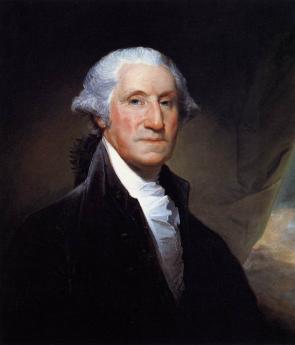
|
| George Washington |
During the first weeks of that exploratory period, Washington induced Congress to create a cabinet and the first four cabinet positions, even though the Constitution did not mention cabinets. It all was explained as an "implicit power", inherently necessary for the functioning of the Executive branch. Soon afterward, Alexander Hamilton as Secretary of the Treasury proposed the creation of a national bank. Madison and his lifelong friend Thomas Jefferson were bitterly opposed, using the argument that creating banks was not one of the enumerated powers granted by the Constitution. Hamilton's reply was that creating a bank was an "implicit power" since it was necessary for running the federal government. Of course, Hamilton and Jefferson both had other unspoken motives for their position: for and against promoting urban vs. rural power, for and against the industrialization of the national economy, and dominating the states in matters of currency and financial leadership. It empowered a national rather than a confederated economy.
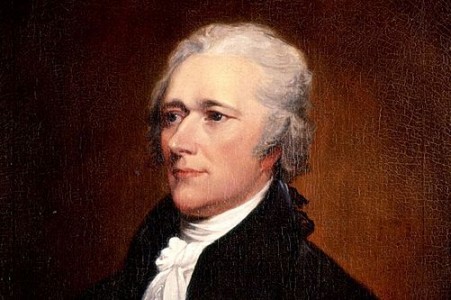
|
| Alexander Hamilton |
For Madison, the legalism probably carried considerably more weight than it did for Jefferson and Hamilton because it demonstrated the enduring consequences of being vague about the boundaries of any constitutional restriction. If this loophole got firmly established, it might reduce the whole federal system to a laughingstock. In order to promote the "general welfare", anything at all could be called an implicit power, and both separation of powers and enumerating federal powers would soon become quaint flourishes. The whole Constitution might fall apart in endless debates. On a personal level, Madison's highest achievements would have to be supplanted by something more practical. Besides which, Madison was a Virginian, a rich slave-holding farmer, and a young politician, seemingly on the verge of a promising career which might easily lead to the presidency for himself. Hamilton his most visible opponent, was already proposing a tax on whiskey which would almost surely antagonize farmers to the west, and assuming the Revolutionary debts of the states was equally divisive.

|
| Mt. Vernon |
As matters eventually worked out, the main disputants made ostensible constitutional arguments, while the real political dispute would be settled by a political deal struck at a dinner. It traded relocation of the national capital to Virginia, for the assumption of the debts of all states (when Virginia had already paid off its debt.) Location of the capitol opposite George Washington's home at Mt. Vernon also took care of difficulties coming from that direction. By the time the uproar about this arrangement subsided, the precedent for settling the inherent conflict between enforcing Constitutional limitations versus enlarging their boundaries had been set. The most opportune time for stricter interpretation was fading while the most likely advocates of it were restrained by their own example. The negotiation was a little unseemly, and probably encouraged similar decisions to migrate to a less conflicted body, which eventually John Marshall would define as the U.S. Supreme Court.
Why Jefferson Hated Banks and Hamilton Loved Them
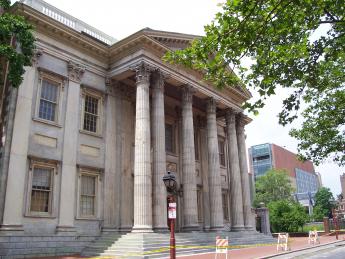
|
| First Bank of Philadelphia |
Some things are easier to understand when they start before they get complicated. That's true of banking, where it can now be puzzling to hear there was a strong inclination to forbid banks by law. While we were still a colony, the British discouraged bank formation, fearing strong concentrations of wealth at a great distance could lead to ideas of independence. Anti-bank sentiment was thus a Tory characteristic, although as the Industrial Revolution progressed, Karl Marx and Fredrick Engels stamped it permanently with a proletarian flavor. Large owners of farmland were displeased to see their power weakened by urban concentrations of wealth, while poor recent settlers of America wanted to buy and sell land cheaply, so they favored a currency that steadily declined in value. People with wealth have an incentive to keep money stable, but people with debts have an incentive to pay them off with cheap money. After these battle lines clarified and hardened, the debate has transformed from an original dispute about banks, into catfights about a strong currency. As Rogoff and Reinhart have pointed out, inflation is a way for governments to cheat their citizens, devaluation is a way of cheating foreigners. Naturally, politicians prefer to cheat foreigners, but national tradition curiously seems to favor one style more than another. Essentially, they are the same thing with the same motive, although outcomes may be different. One is restrained by fear of revolution, the other by fear of an international currency war.
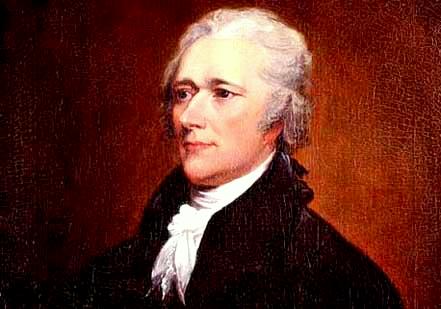
|
| Alexander Hamilton |
While George Washington was America's first president, Alexander Hamilton was Secretary of the Treasury and Thomas Jefferson was Vice President; the cabinet contained only four members. Although Hamilton was born poor, the bastard brat of a Scottish peddler in the view of John Adams, he had learned about practical finance in a counting-house, and later gained Washington's confidence on the headquarters staff; Washington eventually made him a general. Jefferson was part of the slaveholding Virginia planter elite, elegant in writing style and knowledge of art and architecture, sympathetic to the French Revolution; eventually, he died bankrupt. Early in the Washington presidency, Hamilton produced three long and sophisticated white papers, advocating banks and manufacture. Jefferson was opposed to both, one facilitating the other, which we would today describe as taking a green, or leftish position. Banks were described as instruments for accepting deposits in hard currency, or specie, and lending it out as paper money. The effect of this was a degrading of gold into paper money, or if not, an inflationary doubling of currency. Banks would be able to create money at will, a capriciousness Jefferson felt should be confined to the sovereign government. Just keep this up, and one day some former banker from Goldman Sachs would be able to tell the President of the United States, "The bond market won't let you do that." In this sense, the bank argument became a dispute about public and private power.
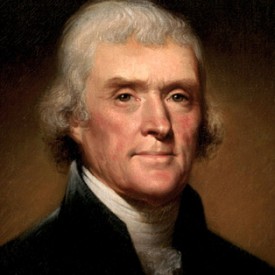
|
| Thomas Jefferson |
Hamilton, a former clerk of a maritime counting house, could observe that sending paper money on a leaky wooden boat kept the real gold in the counting-house even after the boat was lost at sea. To him, prudent banking transactions enhanced the safety of wealth, reducing risk rather than enlarging it. Later on, he learned from Robert Morris that a bank floating currency values on the private market disciplined the seemingly inevitable tendency of governments to water the currency. Once more, banks should enhance overall safety in spite of being vilified for creating risk. To both Hamilton and Jefferson, all arguments in an opposing direction seemed specious, designed to conceal ulterior motives.
Banks came and went for a century. By the time they almost were a feature of every street corner, banks were taking paper money (instead of gold and silver) as deposits and issuing loans as paper money, too; the gold was kept somewhere else, ultimately in Fort Knox, Kentucky. With experience, deposits could stay with the bank long enough that only a rare run on the bank would require more than 20% of the loans to be supported by physical ownership of gold. By establishing pooling and insurance of various sorts, banks persuaded authorities it was safe enough for them to hold no more than 20% of their loan portfolio in reserves. By this magic, loans at 6% to the customer could now return 30% to the bank. A few loans will default, a reserve for defaults was prudent, so the bank with a 2% default rate could settle for a 20% return rate. A bank which was deemed "too big to permit it to default" was invisibly and costlessly able to trim its reserves, and thus receive a 25% return by relying on the government to bail it out of an occasional bank crisis. With this sort of simple arithmetic, it is easy to see why multi-billion dollar banks were soon arguing that 5:1 leveraging was too small, a reserve of gold and silver was unnecessary, and the efficiencies of large banks were needed to compete with big foreign banks. By the time of the 2007 crash, many banks were leveraged fifty-to-one, which even the man on the street could see was over-reaching. The ideal ratio was uncertain, but 50:1 was certain to collapse, probably starting with the weakest link in the chain.
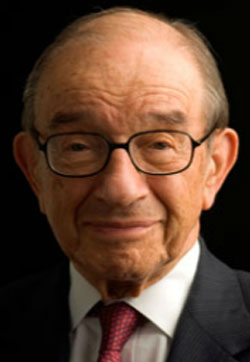
|
| Alan Greenspan |
This brings banking arguments more or less up to date. Except in 1913, an "independent" Federal Reserve Bank was created. It was a private reserve pool balanced by a public partner, the government. In time, the need for gold and silver was eliminated entirely, by the wartime Breton Woods Agreement, and the Nixon termination of it. The predictable inflation which could be expected to result from a world currency without physical backing was prevented by allowing the Federal Reserve to issue, or fail to issue as necessary, the currency in circulation. This substitution was deemed possible by having the Fed monitor inflation, and adjust the flow of currency to maintain a 2% inflation rate. Although 100% paper money was an historic change, it has endured; it has withstood efforts by the politicians to re-define inflation, undermine the indices of its measurement, and brow-beat the vestal virgins appointed to defend the value of the dollar. The old definition of money has changed: it is no longer a store of value, it is only a medium of exchange. The store of value is a nation's total assets. Jubilant politicians have added an additional burden of preventing unemployment, to the original one of defending price stability. In practical terms, the goal is defined as maintaining a 2% inflation rate, while achieving a 6.5% unemployment rate. It remains to be seen whether the two goals can exist at the same time, particularly if the definitions of inflation and unemployment become unrecognizably undermined.
And it even remains to be seen whether the black-box system can be undermined from within. The Federal Reserve is so poorly understood by the public that his enemies now accuse Alan Greenspan of causing the present recession. It is argued that the eighteen years of banking quiet which his chairmanship enjoyed, was only gradual inflation, deeply concealed. It is contended that the unprecedented steady rise of the stock market during those eighteen years was financed by a small but steady loosening of credit by the Federal Reserve. Perhaps what this means is: the definition of inflation must be tightened so its target can be made and adjusted, not to 2%, but to some number slightly less than that, measured to three decimal places. Or that the 6.5% unemployment target must be jettisoned in order to preserve the dollar. With that prospect including international currency wars as its corollary, it will be an interesting debate, and immigration policy is related to it. Because one alternative could become the abandonment of the fight against inflation, in order to sustain the new objective of reducing unemployment, Jefferson would have won the argument.
REFERENCES
| The History of the United States: Course 8500, 15 Hamilton's Republic: ISBN: 156585763-1 | The Great Courses |
| This Time Is Different: Eight Centuries of Financial Folly: Kenneth Rogoff, Carmen M. Reinhart: ISBN-13: 978-0691152646 | Amazon |
Bernanke's QE3: A New Titanic, or A New Bretton Woods?
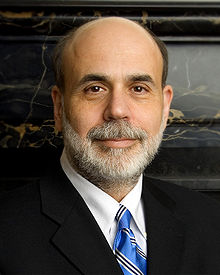
|
| Ben Bernanke |
Nobody likes to execute a guilty prisoner, but in finance, it is surely true that allowing bad debts to remain unresolved harms the whole economy. It makes little difference whether a bank fails to mark its debts to market, whether debts are "extended", or insolvent institutions are subsidized. Andrew Mellon once advised Herbert Hoover that he should "wring the rottenness out of the system", but that is such poor politics that even Hoover rejected it. In time, the process of "good bank, bad bank" was devised to isolate bad debts into a single institution so the rest of the economy could begin to recover. QE3 is a version of a good bank, bad bank. Unfortunately, the public is easily misled in these matters, so although all three Q's involve the Federal Reserve buying long bonds, QE1 unfroze a frozen financial marketplace (successfully), QE2 meant to stimulate the economy (unsuccessfully), but QE3 seems to have much grander ambitions. So it is unfortunate that three different activities share the same name, and still more unfortunate that name is made so mysterious. Let's forget about the first two, and concentrate on QE3.
The Federal Reserve is well along in a program of buying huge quantities of questionable long bonds and has announced it is going to keep buying huge quantities until either inflation exceeds 2.5% or unemployment falls below 6.5%. That's not exactly the same as buying every bad bond in existence, but it could come to that. Instead of letting the holders of those bonds go bankrupt, the Fed is buying the bonds out of circulation, which could rescue a great many investors. Small businesses do not ordinarily issue bonds, so there is some bias in favor of large businesses and banks, but surely not an intentional bias. The effect is to make the Federal Reserve both a good bank and a bad bank at the same time. The main difference between this and wringing the rottenness out is that bankrupt institutions cannot come back to haunt you, while in the more benign purchase of bonds, you have assumed an obligation to pay them back. When you sell them back you drive the price down and the money disappears. Furthermore, when the price of bonds declines, interest rates will rise and the national debt will increase more rapidly. If the economy cannot withstand higher interest rates, a recession will deepen. You have to get the timing right, and the world is in such a delicate state that it is impossible to get the timing entirely right for everybody. Because interest rates are now essentially zero, they cannot go lower, so investment advisors are increasingly advising clients to sell some bonds while they still can. If that gets out of hand, it could start a panic.
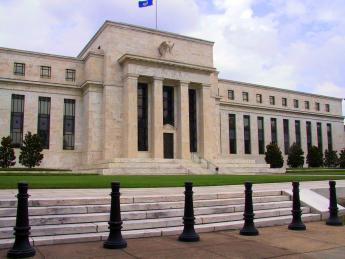
|
| United States Federal Reserve |
However, the United States Federal Reserve is not an investor, it controls the currency and can print unlimited amounts of it. There is nothing which can force it to sell its bond holdings, ever. Without going into the details of the Bretton Woods Treaty, the tie to gold was eliminated nearly fifty years ago. Meanwhile, its bonds are paying interest, which at the moment it is returning to the U.S. Treasury to reduce the national debt. It can reduce this outflow more or less at will, and it can increase it by raising interest rates (ie by selling bonds, as described). With a few extra steps, this enormous pot of debt could become the basis for an international currency reserve. At the least, it could bring a halt to an international currency war. If it chooses, it can decide to wait as long as fifteen or twenty years for economic demand to recover from a century of overleveraging, and then pay it back by letting the bonds reach maturity. But there is at least one big flaw in this dream.
At some point, the bond market may decide to take the bull by the horns and raise rates before the Federal Reserve wishes to. Political appointees come and go, and the bond market could easily decide that a misjudgment has been made by somebody. It could easily happen that public apprehension could grow that something doesn't smell right. In that climate, a few heavy sales could trigger a panic. And then everyone will try to get out the door at the same time.
Bretton Woods
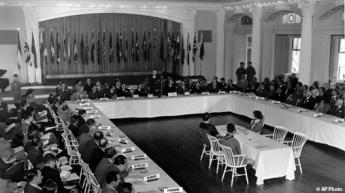
|
| The Bretton Woods conference in 1944 |
Stripped of its mystery and irrelevant details, the Bretton Woods conference agreed that all nations would make their currency convertible into U.S. dollars, and the U.S. would make its currency convertible into gold. Since World War II had left the United States with the only major working economy, it sold goods to the rest of the world and the rest of the world sent us their money to be converted into dollars; we had a "favorable balance of trade." Somewhere in the 1960s the rest of the world got on its feet, and we began to have an unfavorable balance of trade. After a while, foreigners started converting their dollars (the "reserve" currency) into gold. By 1971, the depletion of gold from Fort Knox became alarming, and the United States stopped converting its currency into gold. From that point onward, all currencies became effectively computer notations, whose value as a medium of exchange was what their government said it was.
Paradoxically, it is hard to see how this system would work without a government in charge of it, although private substitutes would probably soon appear if governments relaxed their monopoly on currency. Since a great many people dislike their governments for one reason or another, they chafe at a system which forces them to keep their governments in order to prevent commercial chaos. For those who do not adequately understand this, governments all stand ready to maintain themselves with force, and many other people dislike that feature even more. Since it took place at the same time, the Vietnam protest movement may have had some relation to this major change in the nation, misunderstood perhaps, but viscerally perceived. In view of President Nixon's central role in all of this, one is even tempted to speculate that his electoral promise of a secret means to end the Vietnam conflict, coupled with the subsequent peaceful surge of China and the financial recycling of Chinese money through Treasury bond purchases, may all have been subjects discussed during his historic trip to China.
However that may be, it is a fact that the Vietnam War ended, the Chinese economy flourished with American help, and the deposit of Chinese money in our economy helped fuel a massive economic bubble, and the weakest links in the chain -- mortgage-backed securities -- were the place the bubble burst. Not much of this could have occurred with a gold standard, and in many circles, this was regarded as proof that gold was a barbarous relic. In retrospect, few would deny we had been leveraging our economy to dangerous heights, for nearly fifty years. In 1996, Alan Greenspan denounced our "irrational exuberance", and yet the bubble did not burst for another twelve years. If we succeed in deleveraging our economy until it reaches 1996 levels, it will be regarded as a remarkable success. But the Chairman of the Federal Reserve at that time described it as a dangerous level. And looking back over the centuries, an indescribable number of kings were dethroned or beheaded because they evaded the rather irrational restraints of a scarce, hence precious, barbarous relic. Balanced against that, a billion Asiatics have been raised out of poverty, and the economy of the world overall would seem opulent to our grandfathers. Somehow, we must find the wit and the self-restraint to solve this problem.
REFERENCES
| The Battle of Bretton Woods: John Maynard Keynes, Harry Dexter White, and the Making of a New World Order:z Benn Steil: ISBN-13: 978-0691149097 | Amazon |
Gold Standard Substitutes
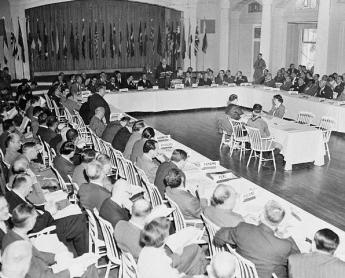
|
| Bretton Woods conference in 1944 |
Make-shift proposals to address international monetary crises after 2007, particularly confiscation of bank deposits suggested briefly in 2013 for the Mediterranean island of Cyprus, stimulated a search for a better monetary system. A gold standard sufficed for thousands of years, but the Industrial Revolution increased world economies faster than gold metal was discovered, constantly driving prices downward. It became increasingly difficult to manage the rapid growth of debt, as happens in wartime. The crisis which led to the 1944 Bretton Woods Conference was the inability to accommodate the massive national debt rearrangements of the Second World War. With the United States owning two-thirds of the world gold supply, international trade was seriously impaired.
Bretton Woods created the International Monetary Fund and the World Bank, which can be ignored for present purposes. It established the United States dollar as a "reserve currency", alone able to be exchanged for gold. Other nations were allowed to exchange their money for United States dollars. Supplemented at the Bretton Woods conference in 1944 by this gold-standard-once-removed (the U.S. dollar as a "reserve currency"), this expedient only prospered as long as the United States could maintain a positive trade balance. After 1960, the outflow of gold from Fort Knox was relentless, and in 1971 the United States was forced to abandon its buffering between gold and the world's banking systems. After 1971 the world's currencies would supposedly trust their central banks to be "lenders of last resort", but in the financial crises after 2007 many could not sustain that obligation. What they could do was devalue their currency, and even that expedient was blocked by the rules of the eurozone. Put to the test, the European Central Bank became uncertain it wanted the role of lender of last resort. At one time, the gold standard had provided the one backing for a currency which was independent of all governments' temptation to inflate away their debts. The U.S. reserve-currency buffer extended the system for several more decades, but after President Nixon cut the link to gold, the post-1971 system only provided a promise of a government rescue, without the universal ability of governments to live up to the promise. In a sense, governments backed their currency with a mortgage on the nation, and many mortgages were already overextended. For those nations, variants of the gold standard had been replaced by no standard at all. Since governments which had historically been the cause of inflation were now expected to be the source of its restraint, the private sector urgently needed to devise a new system to force the public sector to accept a new and unwelcome role.
Money on a gold standard was formerly both a storehouse of value and a means of exchange. The world supply of gold was unable to keep pace with the world's increasing wealth for more than a century, so prices were driven down, disrupting long term debts. Rising prices were just as bad; what commerce needed was price stability. What was devised for the 1971 disruption was inflation targeting. The Federal Reserve and to some extent the other major central banks, issued or withdrew currency to achieve a 2% inflation rate, thus hoping to maintain stable prices with a 2% growth rate. Skipping over the details of central banking, the Federal Reserve could safely count on the government to promote inflation at almost all times; the need was to restrain it to 2%. Unfortunately, contraction at 2% takes about as long as expansion at 2%, frustrating the hope of the public to have booms last as long as possible and depressions to be over as soon as possible. Periodic episodes of deflation are a problem. From time to time the economy expands its production capacity faster than consumption can grow, and the inevitable resulting panic not only impairs the ability of banks to lend but frightens the public away from borrowing. Without a gold standard, prices then fall even farther and faster than with gold support because money no longer has any intrinsic value. Our problem thus reduces itself to two requirements.
Without a gold or other monetary standard, and seeking to preserve the inflation-targeting system, how can we induce prices not to fall in a depression? And, how can we induce a booming economy not to increase its production capacity beyond what it can consume or sell, so that every boom period stops being followed by an uncontrollable crash? That is, much of the problem of keeping production from falling, is to prevent it from going so high it has to fall. That's not so easy in a democracy; if you stand in the way of making money when making money is easy, you will very likely be voted out of office. Price controls, by the way, have been tried many times; they always fail. The practical problem is thus pressed into the mode of forcing savings into some sort of escrow fund, during boom times. Meanwhile, the practical politician must persuade a suffering public that, once you overbuild capacity, it will probably only wear out at the same 2% rate that it took to grow so big. These are not new sentiments; the public must learn self-restraint during booms, something it has repeatedly resisted.
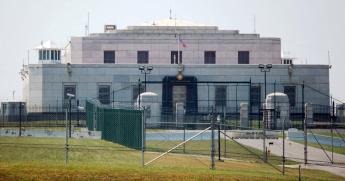
|
| Fort Knox, KY |
Features particularly irritating to the private sector about the Cyprus proposal had several sources, all of them heightened by annoyance that the bureaucracy would immediately try to force the private sector to pay for administrative design blunders. A gold standard permits international trade in defiance of government wishes; a currency without a physical store of value cannot exist without workable rules for international trade. If satisfactory rules cannot be made, voices will demand a return to the gold standard. No one said the Greeks and the Turks should love each other; no one said the Russians must respect private property. What is stated is if workable rules are not forthcoming, private alternatives will arise.
Ben Bernanke is not only the chairman of the U.S. Federal Reserve, but he is also one of the recognized academic experts on managing depression. He has spent his life studying this particular problem and occupies the most powerful position among the group charged with doing something about it. His innovation in the management of a financial crash is QE, quantitative easing. Essentially, this amounts to the creation of a fund managed by the Federal Reserve, generated by purchasing bonds with money created by the Fed. The content, size, and purpose of the fund have varied in the past few years, to the point where it amounts to a gigantic fund at his disposal, as needed, Initially, it injected funds into markets frozen with fear, and successfully unfroze them, making a profit for the Treasury along the way. He next used the fund to manage a gigantic Keynesian effort to stimulate the private economy with a federal fund. While it is possible this stimulus averted some worse disasters, the net effect was not outstanding and is generally regarded as a failure. His current effort, titled QE3, amounts to an enormous effort at what is termed "good bank, bad bank" in financial jargon. Because so many good bonds are undervalued in a recession, it is believed they will return to true market value if the truly bad bonds are removed from the market place. In Victorian days, this was accomplished by bankruptcy, but it is thought to be more humane to buy up and remove them temporarily from the marketplace. The humane approach, of course, has the disadvantage that the bad bonds may reappear later, and some critics say it is only a variant of "kicking the can down the road." It seems to have worked well for the Scandinavians however, and the final verdict cannot yet be issued. For the purposes of the present discussion, the essential point is that a three-trillion dollar discretionary fund has been put in the hands of the most powerful and most knowledgable person involved in international finance. At the moment, the fund contains most of the dubious bonds in circulation, but there are signs that Bernanke plans to replace them with U.S. Treasury bonds, thought to be the safest investment available. He can essentially do anything he pleases with this fund, subject only to the approval of the rest of the Board.
It must have occurred to Bernanke, that this multi-trillion dollar fund of the safest investments on earth would make a highly suitable substitute for gold, if it ever becomes clear that the world needs to return to some tangible commodity to back its currency, or become the new lender of last resort, if we choose to put it that way. Mr. Bernanke essentially needs no one's permission to create this fund, but to use it in some novel way would require the permission of politicians, acting in some way identifiable as the will of the American public. If it should come to that, a few suggested limitations immediately come to mind.
In the first place, one of the main purposes of imposing a gold standard on spendthrift Kings was to keep the King from spending it and substituting his own worthless paper money. Three variants of this threat, inflation, devaluation and confiscation, all amount to the same thing, which would get us back to our present predicament quite quickly, indeed. Mr. Bernanke must realize that our Constitution was written by Founding Fathers who were intensely fearful of entrusting as much power to one person as Mr. Bernanke would likely possess if this idea moved to implementation. To put it bluntly, the first action after it is done should be to surrender the ability to do it. To take another lesson from Constitutional history, it might be remembered that the functions of the Legislative Branch were established in six months, those of the Presidency evolved in the first five years of George Washington's office, and those of the Supreme Court required forty years to evolve. During all of that time, the ability to destroy the Constitution's main purposes had to be shielded from unbelievers, and an apparently unnecessary Bill of Rights had to be appended to reassure the remaining doubters. The main risk to this technical monetary reconfiguration is not monetary, but political.
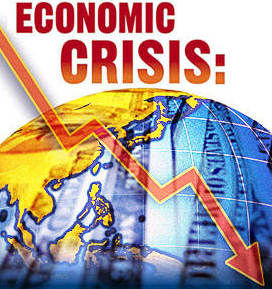
|
| Financial Crisis |
But there are technical issues, as well. Because they are technical, it is more difficult to depend on wise public opinion, and thus it enhances feasibility when technical issues can be translated into political speech. Because events have demonstrated it is much more difficult to reverse a depression than a bubble, thought should be given to devising ways to use this new vehicle to reverse depression. Obviously, it should be used to unfreeze a frozen market; that's an important lesson from the success of 2009. Furthermore, the revenue from three trillion dollars of bonds is appreciable and should be used to finance tax reductions in a recession. More importantly, it should be withheld from government treasuries to restrain a developing bubble, more or less forcing governments to raise taxes during a bubble. Perhaps standards are necessary for expansion and contraction of the fund itself to supplement the use of the fund's income in those extreme situations. Indeed, to forbid the use of principal for those end-purposes might leverage the effectiveness of changing the fund balance, because it would force larger swings of principal to be adjusted. Most of these considerations come into play when a bubble is being restrained because it is easier to restrain a growing bubble than to repair the damage once it bursts. Restraining a growing bubble is not easy, and picking the right time is still less easy. Better to make most of it automatic, and related to defined market benchmarks. Benchmarks may be inaccurately chosen, but at least something is learned for the next time.
Mr. Bernanke's QE fund is not the only one which could take the place of gold in a new monetary standard. Commodities of various sorts would not be much different from gold and might soften the volatility of the mining supply. Land could be used, or fresh water, or petroleum; perhaps we could divide up the ocean in some way. Among the more attractive candidates would be world index funds of stocks or bonds; bonds seem perhaps more suitable, perhaps not. But at the moment, no one seems to be exploring any substitute monetary standard other than gold or the QE fund. Perhaps the disadvantages of each would cancel out in a basket of all the suggested standards. Perhaps inflation targeting can be improved, and no other benchmark is needed; perhaps international branch banking could cover the requirements. And perhaps it is all an academic exercise, but it would still seem helpful if academia would explore a little further, just in case we need them.
New Views for the Economist?

|
| John Micklethwait |
The London Economist has a new editor, and a new owner. Mickelthwait, the old editor, is now working for Blumberg, and ownership has passed from one corporation to another. The two synchronous events may or may not have anything to do with each other, but the name of Rothschild has more or less vanished. No doubt the new management will change the cover page and format a little, but we must wait for a little to see whether their editorial viewpoint has changed very much. A few token viewpoints will probably continue to be sacred, like support for American foreign policy, and admiration for the British socialized health system. But there is a sign, one change may be significant.
Twice in the last few weeks, there has been a serious discussion in the magazine for serious economists, of the same newly-discovered fact. Whenever the private sector generates strong profits, the Economist sees strong evidence the majority of profits soon appear as increased credit in the real estate sector. Industrial profits transform into real estate investments, in other words. No explanation for this strange observation is offered, and perhaps it is just an observation, without a current explanation agreed by everyone. But after skipping that gap, the observation certainly has the potential to explain much of the cyclicity of markets, offering an explanation of why market upturns are so often followed by real estate crashes. And, if we are lucky, followed by some reasonable proposal for preventing such crashes?
If no one else is going to step forward with an explanation, let me offer one. For the small investor, real estate has long been the only available way to get into speculation on interest rates. A thirty-year mortgage starts with small equity and a large debt, and gradually the borrower becomes a lender. Business schools teach that real estate is "where the rubber meets the road". But seeing a real estate boom, the rest of the market heads for the exits.
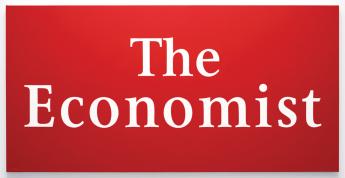
|
| The Economist |
If that's the one-liner we are looking for, it probably neglects the last step. When wealth gets created, by a stock market boom or any other method, most small investors have discovered only one safe and comfortable way to participate. So, having temporarily exhausted that approach, they hesitate. During that period of hesitation, they build up an invisible form of wealth, called credit, which enables them to borrow were before that, they had no credit. The American discoverer of this puzzling concept was Robert Morris, the banker of the American Revolutionary War. And come to think of it, didn't Morris himself encounter bankruptcy and debtor's prison -- from real estate speculation on credit?
So what's new? What's new is that longevity has increased to the point where it is sensible to liquidate the real estate and spend the proceeds on retirement. Having achieved lender status, they then aim to spend their last dime, on the last day of their lives. That seems just perfect, but where have all the credit gone?
35 Blogs
Unwritten Features of the Constitution
 Considerable anger is sometimes directed toward Judges who find unintended provisions in the Constitution. On the other hand, James Madison and some other Founding Fathers were careful to design the Constitution to create outcomes that are far from explicit.
Considerable anger is sometimes directed toward Judges who find unintended provisions in the Constitution. On the other hand, James Madison and some other Founding Fathers were careful to design the Constitution to create outcomes that are far from explicit.
After the Convention:Hamilton and Madison
 Two of the main authors of the Federalist Papers -- and hence of the Constitution -- ultimately proved to be acting on entirely different sets of principles, aiming for widely different goals.
Two of the main authors of the Federalist Papers -- and hence of the Constitution -- ultimately proved to be acting on entirely different sets of principles, aiming for widely different goals.
Alexander Hamilton, Celebrity
 He had the kind of taudry private life and flashy public behavior that Philadelphia will only tolerate in aristocrats, sometimes.
He had the kind of taudry private life and flashy public behavior that Philadelphia will only tolerate in aristocrats, sometimes.
Funding the National Debt
 Funded debt, otherwise known as Capitalism, was a gift to the nation from Robert Morris, Jr.
Funded debt, otherwise known as Capitalism, was a gift to the nation from Robert Morris, Jr.
Morris at the Constitutional Convention
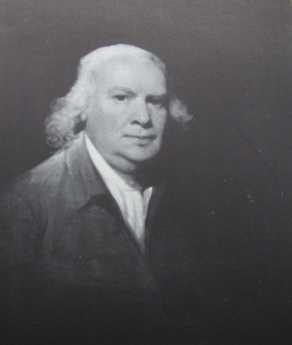 Robert Morris knew that credit is only extended to someone with a reputation for paying his bills.
Robert Morris knew that credit is only extended to someone with a reputation for paying his bills.
Our Federal Reserve : Biddle's Bank (2)
 Nicholas Biddle was a cultured gentleman who invented a lot of the structure of modern banking. But he got in Andrew Jackson's road.
Nicholas Biddle was a cultured gentleman who invented a lot of the structure of modern banking. But he got in Andrew Jackson's road.
Our Federal Reserve: Okayed (3)
 Martin van Buren of Old Kinderhook invented a lot of what
Martin van Buren of Old Kinderhook invented a lot of what
Premature Solutions to the Credit Crisis of 2007
 Proposals for reforms which would prevent another credit crunch are starting to surface. Even in a presidential election campaign, people are pretty hesitant to suggest dramatic reforms. At least, once said Hippocrates, please don't make things worse.
Proposals for reforms which would prevent another credit crunch are starting to surface. Even in a presidential election campaign, people are pretty hesitant to suggest dramatic reforms. At least, once said Hippocrates, please don't make things worse.
Macroeconomics of The 2007 Collapse
 Federal Reserve Rolls the Dice
Federal Reserve Rolls the Dice
 When Lehman Brothers collapsed, the markets froze. The Federal Reserve responded by doubling the money supply. A few months later, the money was gradually spent buying toxic assets. It may take ten years to sell that toxic paper, and whether we then have inflation or depression will depend on the price they bring. The Chinese are financing this ten-year gamble with two-year loans.
When Lehman Brothers collapsed, the markets froze. The Federal Reserve responded by doubling the money supply. A few months later, the money was gradually spent buying toxic assets. It may take ten years to sell that toxic paper, and whether we then have inflation or depression will depend on the price they bring. The Chinese are financing this ten-year gamble with two-year loans.
After a Year of Crisis, Fannie and Freddy Finally Get the Spotlight
 Fannie Fannie Mae and Wall Street's chancy new CDOs are much the same things, only with different sponsors and a few modified features. Important issues are: which model is better, whether continued competition between the two is useful, or whether both should be abolished.
Fannie Fannie Mae and Wall Street's chancy new CDOs are much the same things, only with different sponsors and a few modified features. Important issues are: which model is better, whether continued competition between the two is useful, or whether both should be abolished.
A Single International Currency?
 Half the world cheats, the other half grumbles, when American dollars become a reserve currency for the rest of the world. It will be a long time before the world has a single unified currency, and it may not be desirable.
Half the world cheats, the other half grumbles, when American dollars become a reserve currency for the rest of the world. It will be a long time before the world has a single unified currency, and it may not be desirable.
European Common Currency
 The European central bank has done a good job, but European culture is a little slow.
The European central bank has done a good job, but European culture is a little slow.
Euros and Dollars

As Computers Displace Money, Trust But Verify
 Mainframe computers have been available for fifty years, personal computers for twenty-five. Unless the two come into better balance soon, we foresee a nightmare of government regulation, and perhaps worse.
Mainframe computers have been available for fifty years, personal computers for twenty-five. Unless the two come into better balance soon, we foresee a nightmare of government regulation, and perhaps worse.
Bank Accounting Off the Books
 Recent waves of mergers, one-bank holding companies, and subsidiaries have tangled the assessment of losses in the credit crisis, slowed the acknowledgment of losses, had an inflationary effect, and the appearance of illegality in an environment of blame seeking.
Recent waves of mergers, one-bank holding companies, and subsidiaries have tangled the assessment of losses in the credit crisis, slowed the acknowledgment of losses, had an inflationary effect, and the appearance of illegality in an environment of blame seeking.
Banks: Fragile and Dangerous
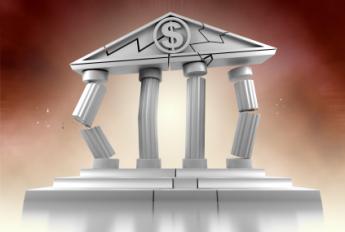 Any business can fail, but when banks fail there can be a panic. Every decade or so, America has a bank panic.
Any business can fail, but when banks fail there can be a panic. Every decade or so, America has a bank panic.
Federal Reserve Changes Its Business Model
 On March 16, 2008, the Federal Reserve stepped in to stop an impending bank panic. It also changed the rules of the game, rather significantly.
On March 16, 2008, the Federal Reserve stepped in to stop an impending bank panic. It also changed the rules of the game, rather significantly.
Financial Institutions of the Future
 Impending financial crisis has pushed everything else off the front page. But looking backward may show where we are likely going.
Impending financial crisis has pushed everything else off the front page. But looking backward may show where we are likely going.
Making Money (8): Virtual Money
 When money was tangible you had to guard it, now that it's mostly virtual you have to verify it. Hardly anybody can, and that's a problem.
When money was tangible you had to guard it, now that it's mostly virtual you have to verify it. Hardly anybody can, and that's a problem.
National Debt, National Blessing
 National surplus is the opposite of national debt. Sounds good, but can it even be contemplated?
National surplus is the opposite of national debt. Sounds good, but can it even be contemplated?
Proposal: A Second Federal Reserve
 Henry Kaufman recently made a number of wise observations about the monetary situation, followed by a radical proposal that might be rather hard to implement.
Henry Kaufman recently made a number of wise observations about the monetary situation, followed by a radical proposal that might be rather hard to implement.
Brave New World
 A surprising secret of the younger generation.
A surprising secret of the younger generation.
Steep Yield Curve: A Useful Subsidy?
The interest rate curve is a subsidy to banks, just as surely as farm price supports are subsidies to farmers.
How The Markets Really Work
A prescient pair of comedians
Poor Richard's Wealth
 Ben Franklin called himself Poor Richard, and he also was invited to visit five kings. Was he rich, or poor?
Ben Franklin called himself Poor Richard, and he also was invited to visit five kings. Was he rich, or poor?
Two Friends Create the Articles of Confederation
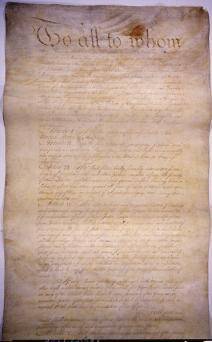 John Dickinson and Robert Morris were good friends who pushed the Articles of Confederation through to ratification. Both of them had been active critics of Great Britain's treatment of the colonies, but both hesitated to sign the Declaration, and both later relented and fought for Independence. Dickinson's final position is less clear, but it was Morris who first saw the weakness of the Articles, and pressed on for their replacement by the Constitution.
John Dickinson and Robert Morris were good friends who pushed the Articles of Confederation through to ratification. Both of them had been active critics of Great Britain's treatment of the colonies, but both hesitated to sign the Declaration, and both later relented and fought for Independence. Dickinson's final position is less clear, but it was Morris who first saw the weakness of the Articles, and pressed on for their replacement by the Constitution.
What Is the Purpose of a National Constitution?
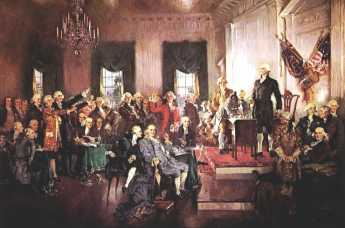 The primary purpose of any Constitution is of course survival. Usually, but not invariably, that means avoiding war with a neighbor which will surely beat you. Having stated what ought to be obvious, the framers of a Constitution need to be careful of the reasons which originally caused the new state to be formed, and also need to avoid provisions which would cause trouble by inciting some different type of governance. These features can be enumerated, but are easily forgotten.
The primary purpose of any Constitution is of course survival. Usually, but not invariably, that means avoiding war with a neighbor which will surely beat you. Having stated what ought to be obvious, the framers of a Constitution need to be careful of the reasons which originally caused the new state to be formed, and also need to avoid provisions which would cause trouble by inciting some different type of governance. These features can be enumerated, but are easily forgotten.
National Debt, Presidential Hat Tricks, Shale Gas and Argentina
 The Franklin Inn Club discusses Obama's maneuvers in the context of what might have been a better approach.
The Franklin Inn Club discusses Obama's maneuvers in the context of what might have been a better approach.
Implicit Powers of the Federal Government
 The Constitution strictly limited the number of federal powers, but did not define their boundaries. Intending to be flexible, it opened a permanent loophole.
The Constitution strictly limited the number of federal powers, but did not define their boundaries. Intending to be flexible, it opened a permanent loophole.
Why Jefferson Hated Banks and Hamilton Loved Them

Bernanke's QE3: A New Titanic, or A New Bretton Woods?
 Ben Bernanke is crossing Niagara Falls on a tightrope.
Ben Bernanke is crossing Niagara Falls on a tightrope.
Bretton Woods
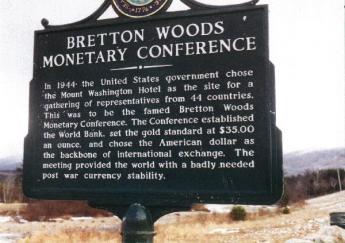 The Bretton Woods conference in 1944 was very simple. The U.S. dollar alone was convertible into gold, but all other currencies were convertible into U.S. dollars. To prevent Fort Knox from being completely depleted of gold, the convertibility of dollars into gold was also soon discontinued. Effectively, all money everywhere was thus just a computer notation, controlled by the U.S.government. Temporarily, the dollar became a reserve currency, supplementing gold. Effectively, we were testing whether we needed a metallic standard at all.
The Bretton Woods conference in 1944 was very simple. The U.S. dollar alone was convertible into gold, but all other currencies were convertible into U.S. dollars. To prevent Fort Knox from being completely depleted of gold, the convertibility of dollars into gold was also soon discontinued. Effectively, all money everywhere was thus just a computer notation, controlled by the U.S.government. Temporarily, the dollar became a reserve currency, supplementing gold. Effectively, we were testing whether we needed a metallic standard at all.
Gold Standard Substitutes
 The monetary crisis which continues since 2007 keeps financiers searching for a better monetary system.
The monetary crisis which continues since 2007 keeps financiers searching for a better monetary system.
New Views for the Economist?
 New blog 2015-11-27 02:24:18 description
New blog 2015-11-27 02:24:18 description